War with words
Prayers for peace
Growing with God Teamwork in Samoa
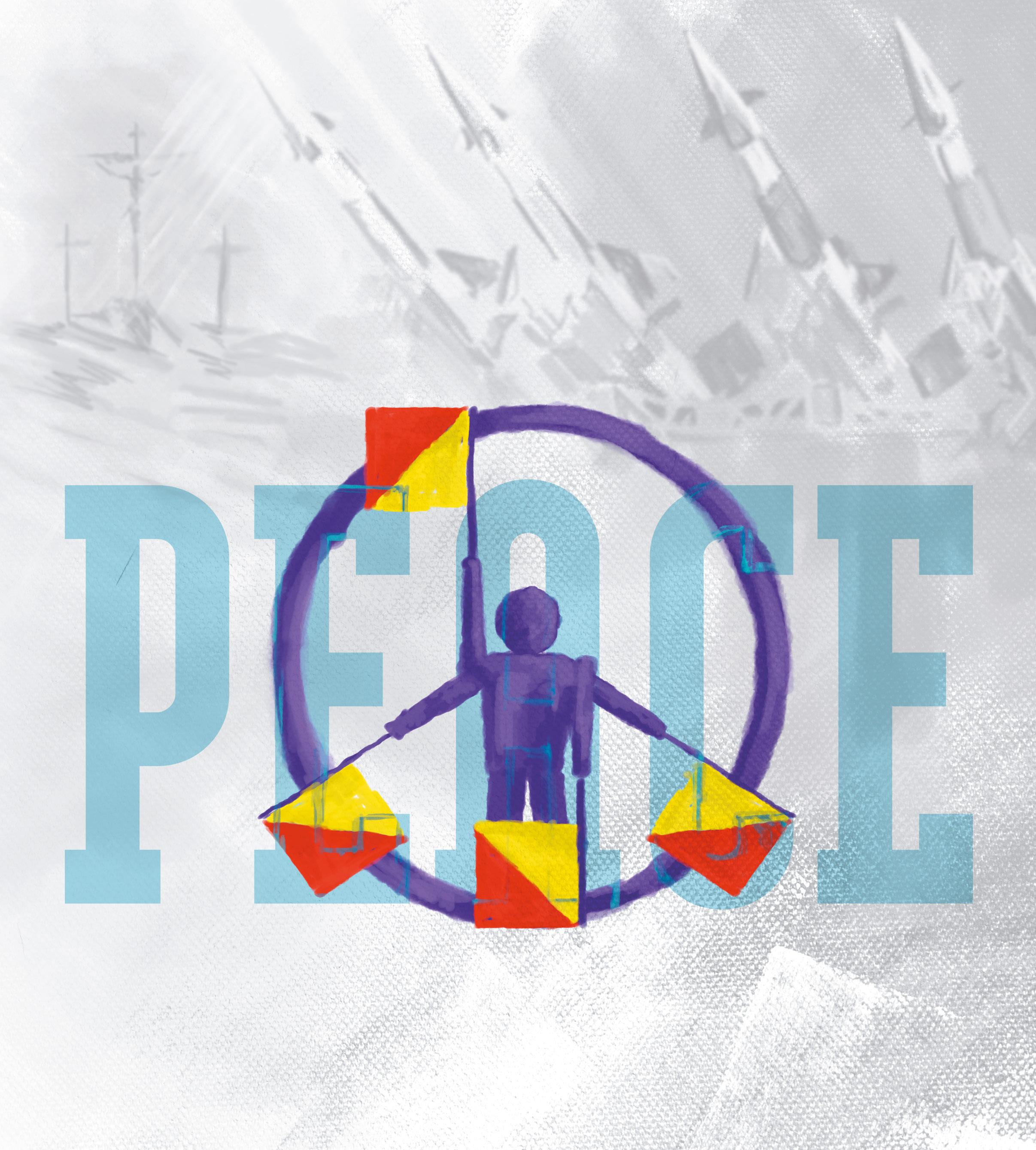
April 2024 | saltmagazine.org.nz
Contents
8 Small Steps, Big Outcomes
Tammie Stroman, Community Ministries kaitohutohu matua, territorial senior advisor for food security, updates readers on Te Kai Mākona since its launch in 2023.
12 Be the Peace
Holly Morton-Chong discusses the important differences between being peacekeepers and peacemakers.
18 The Right Move
Chris Viafale, an addiction services clinician in the Samoa Region, shares his faith journey and the ways God has impacted his life following his return to Samoa.
20 The Hidden Stream
Jules Badger considers the influences of various faith traditions on The Salvation Army and delves into the 'hidden stream' of contemplative tradition.
26 Peace, No Matter What
In part one of a two-part series, Kelly Cooper explores the question: Where in our world can we find the peace that Jesus spoke of?
28 Team Effort in Samoa
Ben Mack reports on the tireless work of Sailivao
Tusa Aukusitino Senio and The Salvation Army Addiction Services in the Samoa Region. SALT
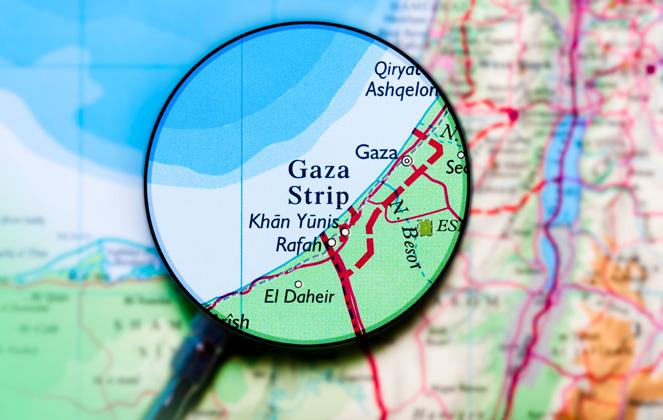


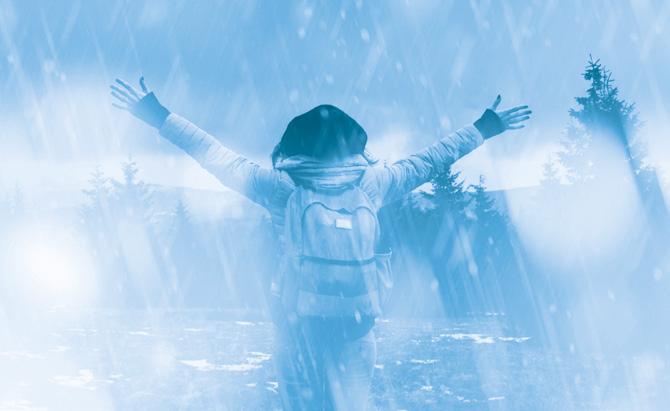
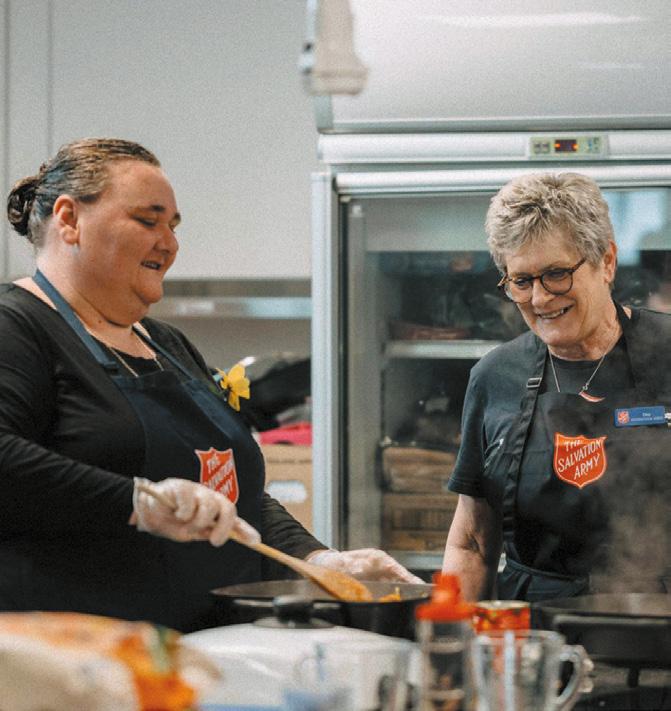

20 18 06 08 34 26 12
The Salvation Army New Zealand, Fiji, Tonga and Samoa Territory Territorial Leaders Commissioners Julie and Mark Campbell General Lyndon Buckingham Founders Catherine and William Booth Editor Vivienne Hill Graphic design Sam Coates, Nicole Gesmundo, Lauren Millington Staff writers Jules Badger, Kelly Cooper, Captain Rachel Montgomery Proof reading Colleen Marshall Connect with us saltmagazine.org.nz SaltMagazine @SaltMagazineNZ salvationarmynzfts Territorial Headquarters, 204 Cuba Street, PO Box 6015, Marion Square, Wellington 6141 p: (04) 384 5649 e: salt@salvationarmy.org.nz Subscriptions mailorder@salvationarmy.org.nz Print Management MakeReady Publishing for 140 years Volume 3, Issue 12 ISSN 2816-1351 (Print) ISSN 2816-136X (Online) All Bible references from the Holy Bible, New International Version, unless otherwise stated. Views and opinions expressed do not necessarily represent those of The Salvation Army. Articles are copyrighted to The Salvation Army, except where indicated, and may be reprinted only with permission.
Magazine
2 April 2024
Transcendent Peace
elcome to the April edition of SALT where we tell the stories of the life and times of The Salvation Army. This month’s theme is ‘peace’. Peace is not only an absence of war, it is the outcome of the undeniable certainty in our hearts and minds that God is in control of the world and our lives, and we can rest, or be at peace, no matter the circumstances.
On page 16, Kelly Cooper shares with readers the power of being a peacemaker in our daily interactions. She also highlights the privileged position New Zealand holds on the Global Peace Index as a peaceful nation. On the 2023 index, New Zealand ranked fourth behind Iceland, Denmark and Ireland as one of the most peaceful countries in the world (well, 99.7% of the world; sadly, the index does not include our territorial Pacific Island nations). Fourth is an impressive ranking when you consider the 163 countries we were measured against, with the quantitative and qualitative measures including everything from perceived criminality in society to weapons imports and exports.
The advantages of living in a peaceful society are immeasurable, though most nations have known war on their lands. This changes not only their heritage, landscapes and economics, but the devastation-wrought impacts the culture and character of the people for generations.
How important is peace to our four nations? What value do we place on peace? These questions are worthy of consideration,
particularly as we see the growing restlessness around the world and the civil and ethnic tensions being played out within various borders. We may feel overwhelmed and helpless amidst the growing bad news, but this cannot be our perspective as Christians. Our world view firmly places the Prince of Peace Jesus Christ at the very centre of the conversation (see page 26).
Also in this edition you will read the stories of the significant work being undertaken in Samoa. On page 28 we revisit the team at The Salvation Army Addictions Services and celebrate the recognition bestowed upon the leader of the programme from the Samoan community. On page 18 you can read the testimony of one of the service’s practitioners Chris Vaifale and how he achieved his dreams through his growing faith in God.
Every day in New Zealand, Fiji, Tonga and Samoa our people are on the ground, at the front lines, assisting people who come to us because they are facing pressures, such as poverty, homelessness and addictions. They may come because we offer services but, more importantly, we can offer them Jesus Christ and his peace which ‘transcends all understanding’.
Vivienne Hill Editor
Do not be anxious about anything, but in every situation, by prayer and petition, with thanksgiving, present your requests to God. And the peace of God, which transcends all understanding, will guard your hearts and your minds in Christ Jesus. PHILIPPIANS 4:6–7
saltmagazine.org.nz 3
Source: Please Don’t Pray With Your Mouth Full, by Bob Swanson.


Red Shield Appeal 2024
Many Kiwi families are doing it tough right now. You won’t necessarily see it, but everywhere neighbours, friends, and whānau are fighting silent battles, struggling to make ends meet. The Red Shield Appeal supports transformation of lives in so many ways. Not just food parcels, but everything, from budgeting advice to wraparound services. This Red Shield Appeal, you can make transformation possible.
For more information, visit salvationarmy.org.nz/RedShieldAppeal
QUICK QUIZ
1 The Nobel Peace Prize is awarded in what European city?
2 Which country was Greenpeace founded in?
3 Who wrote the novel War and Peace?
4 What bird is often used as a symbol of peace?
5 Who wrote the song ‘Give Peace a Chance’?
Answers page 32


WORD OF THE MONTH
Vakacegu (Fijian) peace.
4 April 2024

Herby Sausage Picnic Plait
Real sausages make this pastry plait into a sophisticated relative of the ever-popular sausage roll. | 50 minutes | Serves 6
Ingredients
• 2 bread slices made into crumbs (grate on a coarse grater if you don’t have a processor)
• 1 onion, finely chopped
• 1 tsp mixed herbs
• 1 tsp dried sage
• 1 tsp mustard powder
• ½ tsp salt
Method
• 6 good meaty sausages (approximately 500g [I like a herby Italian flavoured sausage])
• 2 sheets frozen flaky or puff pastry defrosted
• 1 egg beaten with 1 tbsp water for glazing
Preheat the oven to 210°C. Grease a baking tray.
In a bowl or processor combine the breadcrumbs, onion, herbs, mustard powder and salt.
Slice the sausage casings lengthwise and tip the sausage meat into the breadcrumb mixture. Discard casings. Pulse or mix with your hands to combine.
Lightly wet the edge of one of the pastry sheets then overlap the second piece onto the dampened edge. Press down firmly to seal along the join. Trim approximately 3cm off the end of the pastry rectangle and transfer to the greased baking tray.
Scoop the sausage meat mixture onto the pastry, arranging it in a strip down the centre. Shape and neaten, allowing enough pastry either side to completely overlap the filling.
Slice 1cm strips along each side of the pastry—don’t worry if it’s not even, it is a rustic dish. Fold the pastry ends over to enclose the ends of the sausage filling, then criss-cross the pastry strips over the top.
Brush all over with the beaten egg mixture and bake in the preheated oven for 25–30 minutes or until dark golden. Serve warm or cold with tomato sauce or relish.
Source: Sophie Grey | destitutegourmet.com
INTRIGUING INDEX
Autumnal Awesomeness
1 Winging it
Autumn is peak migration season for many species of birds. The Arctic tern migrates the length of the globe to avoid the winter, with some even migrating all the way to New Zealand and clocking up to 70,000km a year.
2 Dark Days
The first day of autumn is known as the autumnal equinox. Latin for ‘equal’, equinox is the only time when both the Northern and Southern Hemispheres experience roughly equal amounts of daytime and nighttime.
3 Leave it
Chlorophyll is a chemical that makes the leaves of trees green. As autumn takes hold, chlorophyll declines and other chemicals become more prominent, revealing the vibrant orange and yellow leaves we enjoy in autumn.
4 Big Boys
The male Siberian hamster’s testes swell up to 17 times bigger than normal in autumn—(don’t Google that!) This happens as the days shorten and the melatonin signals change because of the axial tilt of |the entire planet. Intense!
5 100 Percent
A study in the Journal of Aging Research revealed that babies born in autumn are more likely to live to 100 years old than those born in other seasons.

saltmagazine.org.nz 5
INTERNATIONAL PRAYER
• Bangladesh—While the government works against Islamist extremism, when Muslims convert to Christ they are usually forced to leave their families and are expelled from their communities. Persecution is rife and often results in physical attacks and injury. Pray for the encouragement of Christians who are often the only believers in their villages, and also for access to Bibles.

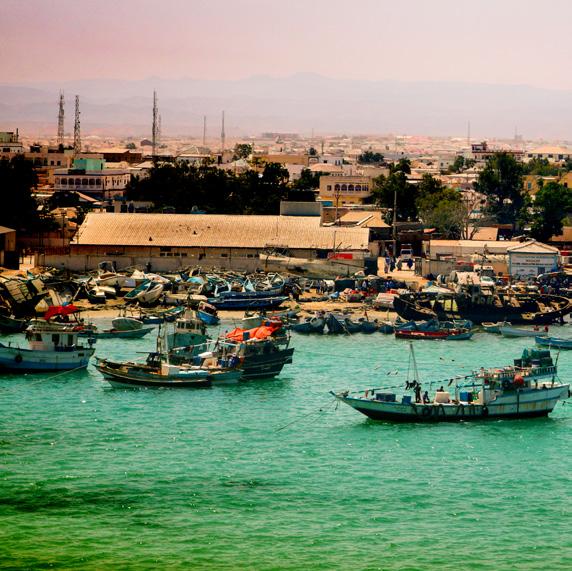

• Somalia—To be Somali is to be Muslim, so when someone converts to Christ they are perceived as not just rejecting their religion but also their nationality. Bibles are illegal to own but most believers have digital access through their phones or devices. There are no church buildings, and it is illegal to evangelise. Christians are actively pursued and killed by the al Shabab terrorist organisation and other Islamist groups. Pray for the safety of believers and courage for those who choose to boldly share their faith despite the danger.
• North Korea—There is no religious freedom in North Korea. Christianity is violently opposed and those who follow Christ are considered enemies of the state. Analysts estimate there are around 30,000 Christians currently in prisons and labour camps where they are starved, tortured and overworked. Families are punished to encourage reporting on family members. Pray for success for those smuggling in Bibles and safety for those who broadcast the gospel over the radio.
SALVATION ARMY PRAYER
Navua Corps Plant; Nelson Tasman Bays Corps; New Lynn Corps; New Plymouth Corps; Newtown Centre; Northland and Auckland Areas; Nuku’alofa Corps; The Salvation Army in Tanzania; and The Salvation Army in Uganda.
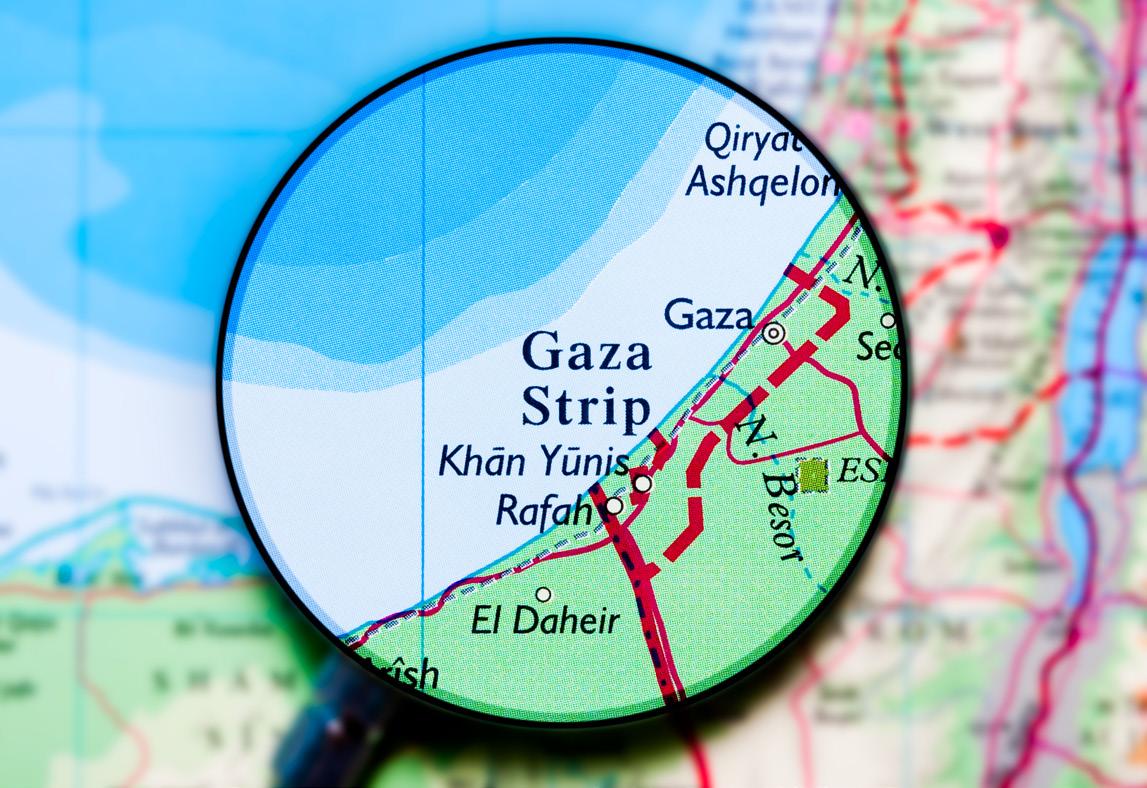
Prayer Focus: Gaza
The Gaza Strip is a narrow piece of land that is bordered by Egypt and Israel, and lies along the Mediterranean Sea. It is 41km long and 10km wide and is one of the world’s most densely populated places. Gaza has been occupied by various empires and has been a site of conflict for decades. Gaza is not a country but a self-governing Palestinian territory (along with the West Bank). The United Nations reports that just over three-quarters of the population of Gaza are registered refugees or the descendants of refugees. Prior to the current conflict, it was home to 2.2 million people. Six months into the current conflict in Gaza, the situation remains fraught and tense. Civilians continue to be adversely impacted, and efforts towards peace and humanitarian aid remain critical.
As Christians, it is imperative that we faithfully pray with compassion and hope for peace to prevail in this troubled region.
Some prayer points for Gaza:
• Peace and Ceasefiret—Pray for an end to violence and hostilities, and a lasting ceasefire that brings relief to affected communities.
• Safety and Protection—Pray for the safety and protection of civilians, especially children. May they find refuge from harm.
• Healing and Comfort—Pray for those who have lost loved ones, and for those who have been injured. Pray they find healing both physically and emotionally. May they know God’s comfort during their grief.
• Humanitarian Aid—Pray for the swift delivery of humanitarian aid to Gaza. Pray that essential supplies reach those in need, including food, medicine and shelter.
• Dialogue and Reconciliation—Pray for leaders and negotiators to engage in meaningful dialogue that leads toward lasting peace.
• Hope and Resilience—Pray for hope to prevail even in the darkest moments. Pray that the people of Gaza find strength and resilience to endure and rebuild.
6 April 2024
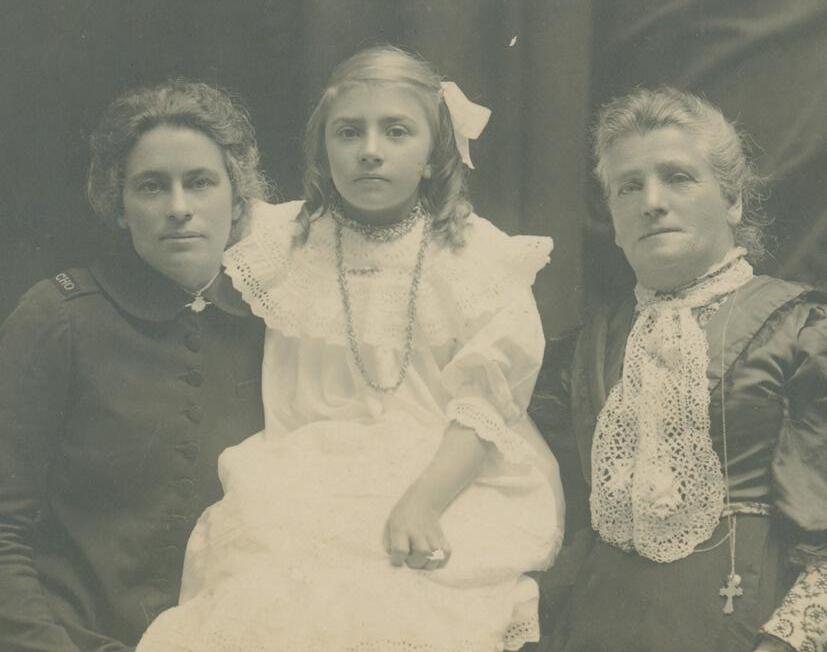
Do You Know These People?
If you recognise the people in this photo, we’d love to hear from you.
Email: archives@ salvationarmy.org.nz

Avatar: The Last Airbender
Action, adventure | Created by Albert Kim | Available on Netflix
This live-action series has been long awaited by many fans of the original animated show from 2005. The show centres around a young airbender named Aang, who is given the huge mission of stopping a war and saving the world with the help of his friends. The fantasy setting really comes to life in this live-action version, especially for the stunning elemental bending fights that make this story so captivating. There is also a good balance in the storylines they chose to include and combine, as they had to condense 20 episodes into eight for this first season. Whether you are a recent fan of the story, or you watched the show until you had it memorised, this new take on an old favourite is worth a watch. (Reviewed by Holly Morton-Chong)
We do not need guns and bombs to bring peace, we need love and compassion .
MOTHER TERESA
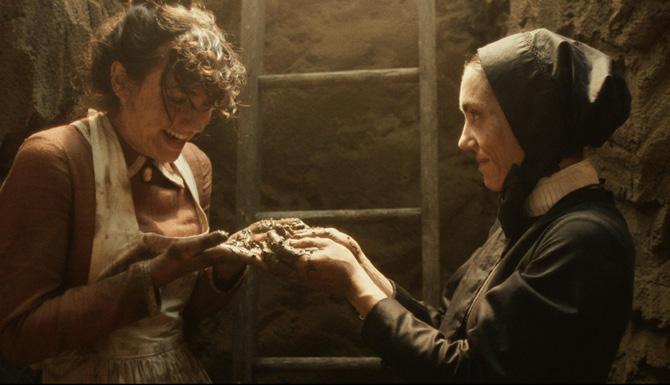
Cabrini
Biography, drama | M (violence) | Directed by Alejandro Monteverde
After her dream of starting an orphanage in China is denied, Francesca Xavier Cabrini, a nun from Italy, is sent to Manhattan USA, to serve the dying Italian immigrant community. Plucky and unrelenting, Cabrini faces opposition and obstacles at every turn. In addition to being a woman operating within maleled power structures (both Church and state), Cabrini is also an immigrant, and following a childhood accident, is also considered ‘frail’. Her vision to ‘build an empire of hope’ across the globe, and her achievements across her lifetime are truly inspiring. You will leave the film feeling like you really could be doing a bit more to make the world a better place. I enjoyed the period architecture, sets and costumes which helped to pass the time in the slower, more repetitive parts. (Reviewed by Lauren Millington)

Unlocking Us
Relationships | Vox Media Podcast Network
With a hiatus over the past year, Brené is back and wasting no time talking about the big stuff we all face as global citizens. Flagging any monetisation for the first three podcasts of 2024, Brené is unapologetic in her focus on the latest conflict in Gaza, and passionate about conversations with those living in the region and working together for peace. With both Palestinian and Israeli guests, these latest episodes are a ‘must listen’ for anyone serious about understanding the complexities of the situation in Gaza. With episode titles such as ‘Ali Abu Awaad and Robi Damelin on Nonviolence as The Path to Freedom’ and ‘Khaled Elgindy on his book: Blind Spot: America and the Palestinians, from Balfour to Trump ’, I highly recommend setting three hours aside for this important conversation—I learnt so much.
(Reviewed by Jules Badger)
saltmagazine.org.nz 7
Small Steps, Big Outcomes: Realising our Te Kai Mākona Food Security Strategy
The Salvation Army is changing the way it provides food. Tammie Stroman, Community Ministries kaitohutohu matua (territorial senior advisor for food security), updates SALT on the multi-faceted approach to food security of Te Kai Mākona since its launch in July 2023.
WORDS Tammie Stroman
e iti hoki te mokoroa nāna i kakati te kahikatea. While the mokoroa grub is small, it cuts through the white pine.
This whakataukī (proverb) speaks of the truth that something much larger can slowly be overcome by something smaller. Similarly, when we think about actualising food security, it can often seem too big to fix. We get overwhelmed by the bigger picture sometimes, weighed by frontline demand and daunted by the long trudge towards systemic change. However, it is our relentless increments that carve out food secure pathways, one small yet mighty step at a time.
There is power in small acts
Our Te Kai Mākona (TKM) food security framework, launched externally in July 2023, envisions all people in Aotearoa New Zealand being fully satisfied, with our Community Ministries being places of support and connection to strengthen food security. The framework focuses on three key pou (pillars): strengthening food
provisions to meet the needs of those experiencing food hardship; strengthening food security through additional food supports; and addressing the root causes of food insecurity to transform the broken food systems. We are the soldiering grubs cutting through white pine, making small strides towards bigger outcomes through community-driven initiatives, localised solutions and collaborative efforts that make significant collective impact. But how do we know if we are making a difference?
Monitoring and evaluation
Global trends suggest as we move through 2024, food security is likely to remain one of the critical challenges for the world to face (Aotearoa included), with a growing proportion of our population indiscriminately experiencing food insecurity. The World Bank has included ‘food and nutrition security’ among the eight global challenges to address at scale, and the United Nations has named their second
8 April 2024
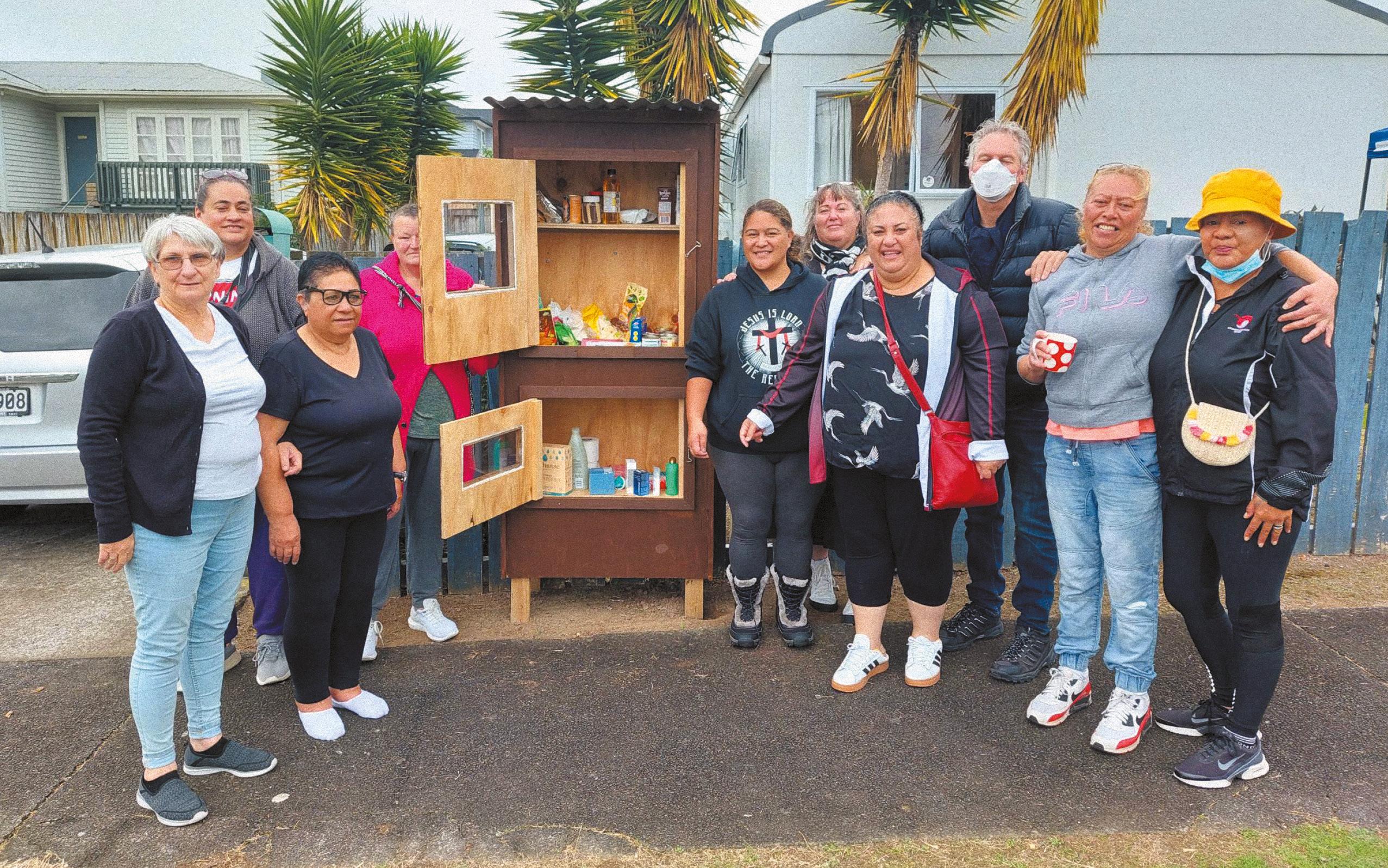
Sustainable Development Goal (SDG), zero hunger, as being critical to resolving the other 16 Sustainable Development Goals by 2030.
At the start of 2024, about every three working days during January, our foodbanks distributed over 1000 healthy food parcels measured against the ‘Aotearoa Food Parcel Measure’ sector standard, with a progressive move towards all our foodbanks offering some form of a choice model. A big focus of Te Kai Mākona is honouring the nutritional adequacy of kai with those we support, although our food security strategy is not about getting better at food parcelling, we want to get better at our responses. This is a conscious pivot of our TKM strategy to manoeuvre towards sustainable food security solutions and away from temporary responses to food insecurity—in part to minimise people’s dependency on external food support.
The annual update of the 2022–2023 New Zealand Health Survey was released at the end of December 2023, with household food insecurity for children revealed to be sitting at 21.3 percent. More than one
…it is our relentless increments that carve out food secure pathways, one small yet mighty step at a time.
in three Māori and Pasifika children live in households where food runs out.
By turning our TKM framework into a plan with measurable outcomes that we can evaluate, we ambitiously imagine whānau (families) no longer requiring our foodbanks by 2030, because we are places of support and connection that strengthen food security (aligning with the United Nations Sustainable Development Goals that Aotearoa has committed to). This does not negate some level of need we will ultimately continue to respond to, nor does it resolve poverty in its entirety, but it does give our movement an emphasis towards tackling root causes of food insecurity, as well as opportunities to onboard food empowerment initiatives.
In October 2023, the World Bank updated the World Food Security Outlook (WFSO). Published three times
Above: A pātaka kai (storehouse) is part of the food security response The Salvation Army is supporting in Manurewa.
saltmagazine.org.nz 9
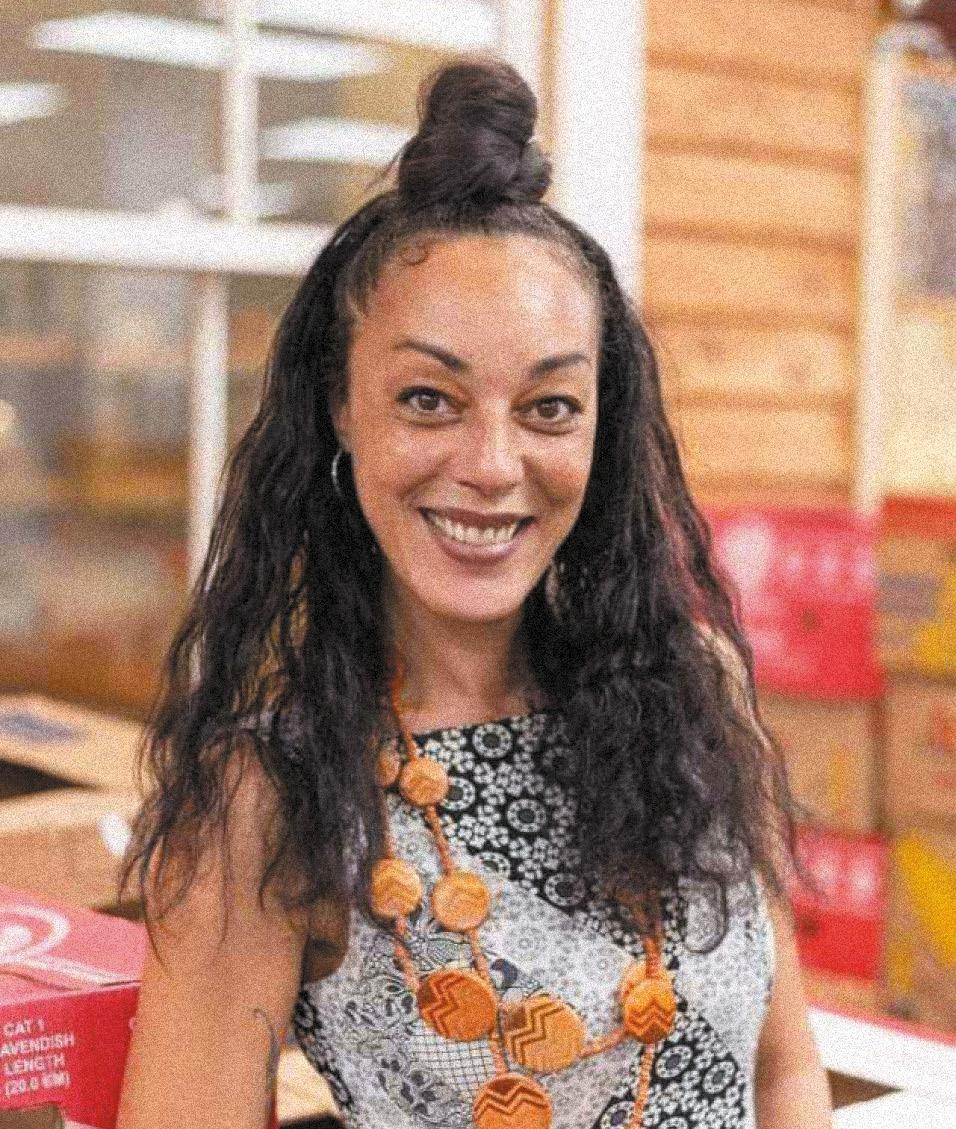
a year, the WFSO is an innovative model-based data series designed to monitor and analyse global food security, providing essential information and statistics to help understand the evolving landscape of this sector. The Salvation Army has a wealth of accessible data collection, and we are also in the process of monitoring and evaluating our collective Te Kai Mākona journey.
This will involve expanding on what works to realise our vision by 2030, establishing a collaborative reference group of Te Kai Mākona champions to help us along the journey, and through communities of practice, learning from and sharing with each other— including communications and pānui (newsletters)— to amplify our vision and to uplift our stories.
‘They all ate and were satisfied’
All throughout Aotearoa New Zealand and across the motu (land) our Community Ministries have been making significant practice changes, onboarding a variety of additional food supports to strengthen food security that include Choosing Kai, Buying Kai, Growing Kai, Cooking Kai, Sharing Kai and Partnering and Collaborating around Kai. Through enterprise, innovation and imagination, we are shifting our country towards abundance for all.
In the context of Aotearoa New Zealand, we have plenty of good food available—however, we have a problem with all people having equitable access to
that food. Research released by Kore Hiakai Zero Hunger Collective May 2023 highlighted food security barriers that included profit-driven industrial food systems at the expense of local economies and the rising costs of living. Kai in Aotearoa and around the globe is mostly treated as a commodity and not a basic human right, and while ‘access’ in our country can imply a geographical sense, it is mostly related to economics. The story of food insecurity in Aotearoa is not one of food scarcity—it is one of social justice.
Since modernised foodbanks began during the mid1980s, the distribution of food parcels has helped temporarily address the emergency food needs of those experiencing food hardship, though they do not address the root causes of food insecurity or help to create sustainable food security.
The Salvation Army Te Ope Whakaora continues to uphold others in compassion, supporting the needs of those most marginalised in communities.
The United Nations Food and Agriculture Organisation describes food security as having six facets: availability, access, utilisation, stability, agency and sustainability. ‘Food security exists when all people, at all times, have physical, social and economic access to sufficient, safe and nutritious food that meets their dietary needs and food preferences.’
While we imagine Aotearoa New Zealand as having a ‘thriving’ population, systemic change related to income, the cost of living and being able to honour nutritional adequacy are integral factors and alternative lenses to use in order to look for longerterm solutions. ‘Thriving’ requires sufficient income to be able to participate fully in one’s community,
Above: Tammie Stroman, Community Ministries kaitohutohu matua (territorial senior advisor for food security).
10 April 2024

alongside affordable housing and living costs, with dignified access to enough good food. We know that different parts of people’s lives are affected by food hardships, so any solutions to food insecurity should be developed with these in mind.
The extended definition of the Māori word ‘kai’ from the Kore Hiakai Zero Hunger Collective states that, ‘Kai, as a noun, is food. However, it is also a verb, as consumption is only one part of a cycle that also includes production and distribution. When a whānau has the ability to contribute to and determine the production, sharing and consumption of kai, they are in a state of food security and sovereignty. They are able to determine their choice of, access to, and quality of the kai they consume. A Māori understanding of kai also does not view an individual in isolation. Individuals must be empowered to make choices about their own kai production, distribution and consumption. We are whānau together. To have a system that champions kai is to have one that champions community and champions whenua (land). To look after the people means to look after the whenua.’
In a country that produces a volume of food that could sustain our entire population, part of what will help enable food security is our Community Ministries collaborating and creating the conditions to positively impact local food systems, and by fulfilling our roles as responsible caretakers.
Above: The Salvation Army has been running cooking classes as a way to empower people to become more food secure.
He waka eke noa—we’re all in this together
Referring to our wider organisational commitment to work in unity while leaving no one behind, The Salvation Army Te Ope Whakaora continues to uphold others in compassion, supporting the needs of those most marginalised in communities. As community kai champions, we work relationally through whanaungatanga (relationships), offering places to be seen and held through manaakitanga (hospitality) and by giving service with aroha (love). These values sit at the heart of our Te Kai Mākona framework, as we initiate food security solutions in partnership and work towards impactful common goals.
Every relentless step counts. Whether advocating for policy change, onboarding additional food support and supporting local food initiatives, or spreading awareness and changing our own narratives, every step contributes towards more food secure pathways.
Let us embrace the collective power of the small strides we make by staying committed to the cause and working together: Te Kai Mākona—where all are fully satisfied. Together we can bring transformation for our communities and make Aotearoa New Zealand a food-secure nation.
saltmagazine.org.nz 11
Be the Peace
We are called as Christians to be peaceful people, but what does that look like? Holly Morton-Chong discusses the important differences between being peacekeepers and peacemakers, and how Jesus exemplified this in a radical way.
We know that Jesus is called the Prince of Peace, but often that can give us an idea of Jesus as this zen untouchable being who never took sides and never upset anybody. However, that is not the image of Jesus in the gospels. Jesus often did things that we might see as overturning the norms around him: healing on the Sabbath, refusing to pass judgment on the woman the Pharisees wanted to stone, or welcoming Zacchaeus—which led to his repentance and reconciliation with his community.
Often the instruction we ourselves are given around peace involves not quarrelling and remaining in everybody’s good graces. We are told to curate inner peace so that the outside world doesn’t trouble us. While these things aren’t negative by themselves, this view of peace minimises the active role that we are tasked with in ‘making peace’. We are called to this practice in our journeys of following Jesus, into the role of peacemakers (Matthew 5:9), rather than peacekeepers.
Peacekeeping and negative peace
Peacekeeping is the form we often think of when it comes to being ‘peaceful’. There is a strong emphasis on making sure everyone gets along, and directly avoiding anything that may lead to conflict or disagreement. However, peacekeeping also means that we give in and sacrifice our own wellbeing, or prioritise the peace of one party over another, to maintain the appearance of peacefulness externally.
The kingdom of God is a kingdom of justice and peace; full true peace that leads us and others into wholeness.
In conflict resolution, this is what is referred to as negative peace. Negative peace is defined as the absence of violence and conflict. However, the ruling and enacting of negative peace is criticised as not enabling justice and fairness. Negative peace can look like simply separating two fighting children or taking ‘criminals’ off the street so that crime is reduced. The immediate outcome improves the situation, but there is no attention given to fixing the situation that caused the conflict in the first place.
An important thing to note about this form of peace, whether on a global or personal scale, is that it often results in the keeping of the status quo. If someone is being mistreated, then a peacekeeping stance will continue that mistreatment in order to not upset anyone else involved.
In cases of global conflict, the call that leaders make for peace is often
12 April 2024
a call for peacekeeping. As Irish poet, theologian and conflict mediator, Pádraig Ó Tuama says, ‘meeting in the middle is not peace, it is failure’. He explains that this middle ground can lead to the continued oppression of vulnerable groups if things simply return to how they were before the conflict.
Peacemaking and positive peace
Peacemaking, on the other hand, takes actionable steps to resolve both internal and external unrest in order to create true peace for others and for ourselves. Sometimes this may require facing conflict to come to a long-term solution for all parties.
In this case, what is being sought instead is positive peace. Positive peace is defined as reconciliation and restoration through the creative transformation of conflict. It considers social, economic and
If someone is being mistreated, then a peacekeeping stance will continue that mistreatment in order to not upset anyone else involved.
political factors that can lead to conflict and works with those involved to come to the best outcome for all. This would look like sitting down with the fighting children and taking the time to figure out why they are at odds with each other, and what can be done to help them be friends again.
The goal for peacemaking is always reconciliation; for things to be made better for everyone involved and to become closer to each other as a result. This won’t always happen, but
our hope should be for an outcome that brings people together and results in a long-term peace that is forged by meeting the issues that create ‘un-peace’ head on.
The goal for peacemaking is always reconciliation…
The kingdom of God
The stories we read of Jesus as a peacemaker all have the possibility (and, in some cases, the reality) of upsetting someone or causing division between the people involved; however, in these instances Jesus spoke up and used his actions to bring peace to the lives of marginalised people and healing to communities. This doesn’t mean that everyone was happy with what he did, but Jesus always gave the people around the choice to come together and be reconciled in these movements of peace.
The kingdom of God is a kingdom of justice and peace; full true peace that leads us and others into wholeness. As disciples of Jesus, we are called to take the first step and reach out towards others in reconciliation to bring that kingdom to earth by seeking positive peace as peacemakers. This is the role we are tasked with.
There are times when we may understandably feel worried about how it may be received, and we may not always get it right, but when we prioritise the peace and justice of Jesus and commit to speaking truth in love (Ephesians 4:15) we can bring more life and more hope into spaces that others are afraid to speak up in.
saltmagazine.org.nz 13
A Life of Shalom
Welcome in the name of our Lord Jesus Christ. At the time of writing this article I sit in Tonga Regional Headquarters reflecting on the past weekend when Julie and I, and the Tonga regional officers, travelled to Vava’u Corps Plant to celebrate their 10-year anniversary with them.
There were over a hundred people who gathered for this celebration, and we thank God for the years of ministry on this island. During this time seven junior soldiers and five senior soldiers were sworn in, as well as a number of people making first-time decisions to follow Jesus.
This month’s SALT theme is about peace, which in the Hebrew language is ‘shalom’. The deeper meaning of shalom is to be safe, sound, healthy, complete, whole and in harmony; it’s a state of calm without anxiety or stress. It signifies a sense of wellbeing and harmony both within and without. Shalom also includes the idea of vigour and vitality in all dimensions of life. In short, shalom speaks of holistic (holy) health for our souls and spirit.
In the Bible, shalom means universal flourishing, wholeness and delight. It’s the way things ought to be, however so often they are not. We know that on many levels this universal flourishing has not been this way, but it’s a message we need to hear and experience in a much greater way personally and in our nations.
In John 10:10 in the Bible, Jesus said, ‘The thief comes only to steal and kill and destroy; I have come that they may have life, and have it to the full’.
This verse is a key verse for us as The Salvation Army Te Ope Whakaora which is translated as ‘the Army that brings life’. It’s the vision that all may experience life in all its fullness— to flourish, to experience shalom.
It’s a vision that together we live out the good news of Jesus Christ so that everyone can experience hope, wholeness and ongoing transformation—the fullness of life as God intended.
We saw this first-hand in Vava’u and we praise God for all he has done in the past 10 years, and believe for even more lives to be transformed and to experience fullness of life in Jesus in the next 10 years and onwards.
So, in conclusion: ‘May the God of hope fill you with all joy and peace (shalom) as you trust in him, so that you may overflow with hope by the power of the Holy Spirit’ (Romans 15:13). May it be so!
Commissioner Mark Campbell Territorial Commander
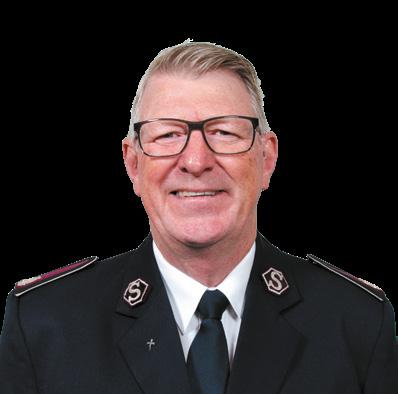
John 10:10
The thief comes only to steal and kill and destroy; I have come that they may have life, and have it to the full (NIV).
Heoi anō tā te tāhae e haere mai ai, he tāhae, he patu, he whakamōtī hoki. I haere mai ahau kia whiwhi ai rātou ki te ora, inā, tōna nui noa atu (PT)
Sa sega ni lako wale mai na daubutako, me butako ga, ka ravuravu, ka vakarusa: au sa lako mai me rawa vei ira na bula, ia me rawa vakalevu sara (FOV).
Chor to khali chori kare, jaan se maare aur nuksaan kare aay hei. Ham to aaya hei ki u sab ke jeewan mile, aur puura jeewan mile (FRHNT)
Tala‘ehai ‘oku ha‘u ‘a e kaiha‘a ki ha me‘a, ka ke kaiha‘a pe, mo tamate‘i, mo maumau: ko au kuo u ha‘u koe‘uhi ke nau ma‘u mo‘ui, pea ke nau ma‘u ‘o lahi ‘aupito (TMB).
O le gaoi, e leai se tasi mea e sau ai na ona ia gaoi, ma fasi, ma faaumatia; ua ou sau ina ia latou maua le ola, ia maua atili ai lava (SOV)
14 April 2024

Salaam Arabic
English
peace
vakacegu
Fijian
םוֹלשָ
Shalom Hebrew
te rangimarie
Māori
filemu
Samoan
melino
Tongan
سلام
At War with Our Words
Media headlines echo the widespread call for peace in our world. In the midst of this noise, Kelly Cooper delves into a slightly quieter battleground— the one where we are at war not with weapons, but with our words—and explores what it means to be a peacemaker right where we are.
Annually, the Institute for Economics and Peace publishes the ‘Global Peace Index’, assessing nations’ peacefulness across 23 indicators.
Since 2014, New Zealand has regularly featured in the top five most peaceful countries in the world. We boast the rare status of being a nuclear free country, our police officers do not routinely carry guns, and our petty crime rates are considered low on a global average. One might characterise us as a peaceful nation, yet many of us report being engaged in some type of conflict.
In our corner of the world, we enjoy the liberty of holding and expressing our individual opinions. We hold tight to our right to freedom and seem to be growing increasingly wary of top-down control. Our media invites us to wade into conversations and assume positions on every situation imaginable: social injustices, environmental sustainability and racial inequity,
just to name a few. Which side do you take? Who do you align with? What is your stance? We may not be fighting with weapons, but many of us are fighting with our words.
The Bible tells us that words are powerful (Proverbs 18:21); that they can wound (Proverbs 12:6); and that they can build each other up and be life-giving (Ephesians 4:29).
The words we speak to others, share online and even utter to ourselves matter. So how then can we participate in conversations and communicate with one another in a way that honours God, especially when we do not agree?
The Greek term for peace in the New Testament originates from the word ‘eiréné’, which means ‘to join’. Living in peace meant, and continues to mean, joining with others. Throughout history we are provided with many examples of women and men who have joined the conversation with peaceful
expression. They understood both the significance of their words and knew how to enter conversations in a way that did not minimise the power of others. Even in times of disagreement, they demonstrated how to engage in dialogue and articulate their thoughts and opinions peacefully.
Dorothy and Martin
Dorothy Day was a renowned American social activist and devout Catholic who epitomised the art of peaceful expression through her words. As a co-founder of the Catholic Worker Movement, she used her platform to advocate for social justice, nonviolence and the rights of the poor and marginalised. Dorothy’s writing, particularly in the Catholic Worker newspaper, demonstrated her unwavering commitment to pacifism and love. Despite being arrested on several occasions and publicly challenged by many, Dorothy demonstrated the
16 April 2024
We may not be fighting with weapons, but many of us are fighting with our words.
transformative power of words in fostering compassion and positive social change.
Martin Luther King Jr is well known for his work advancing civil rights for people of colour in the United States through the use of nonviolent resistance. Martin participated in and led peaceful marches for the right to vote, labour rights and desegregation. He was jailed, physically assaulted and threatened on several occasions, yet did not waver from his commitment to peaceful methods. Martin is well remembered for his words, particularly his ‘I Have a Dream’ speech, which is recognised as one of the most iconic speeches in history. Understanding that ‘peace
is not merely a distant goal that we seek, but a means by which we arrive at that goal,’ King exemplified in his life and through his words that the path forward is always one of peace.
Words at the well
One individual who undoubtedly endured numerous unkind words directed both toward her and about her is the Samaritan woman Jesus encountered at the well in the Gospel of John. In John 4:7 we learn about a conversation Jesus had with this woman who had come to get water in the middle of the day. The Samaritan woman was an outcast who was ostracised by her community for being an unmarried woman living openly with the sixth in a series of men. Jesus didn’t point the finger about her domestic situation or speak in an accusatory tone. He didn’t use his position or power to assert influence or authority. Instead, he invited her to join him in a conversation by
asking a question, ‘Will you give me a drink?’ After the woman’s initial surprise at being addressed, their conversation not only altered the course of her life but positively impacted the lives of many others as well.
They knew how to enter conversations in a way that did not minimise the power of others.
Peacemaking is a central theme in Jesus’ teachings. In his Sermon on the Mount, he tells us ‘Blessed are the peacemakers, for they shall be called sons [and daughters] of God’ (Matthew 5:9). Jesus’ interactions with others were typically characterised by compassion, empathy, understanding and a profound respect for their dignity. He often began his conversations with kindness regardless of the social status, background, or circumstances of the individual he was speaking to.
On the night before Jesus died, when his followers tried to protect him from arrest and strike with their swords, he commanded ‘No more of this!’ (Luke 22:51). Jesus chose peace, and he encourages us to do the same in our actions and with our words. He taught us an alternative way to fight, one that sometimes looks a lot like withdrawing to have victory. When we join with others in conversations as curious questioners and lean-in listeners, we understand the power of peaceful expression. Jesus reminds us too, ‘no more of this’. Perhaps it’s time to let Jesus have the last word?
saltmagazine.org.nz 17
The Right Move
Chris Vaifale is a clinician in the addiction services team in the Samoa Region. He shares his faith journey, and the ways God has impacted his life following his return to Samoa.
I grew up in West Auckland, New Zealand. I have always had a passion for sport and music, but my faith has remained my number one. I was raised within the Methodist Church where my father is a lay preacher, and I now serve as a lay preacher myself. My parents chose to move from Samoa to New Zealand to provide my sister and I with better opportunities. I find it funny that God had other plans for my life, as I have now been living back in Samoa since 2016.
Christianity and my faith have always been a big part of my life. I’ve had times when I’ve experienced challenges and my faith has been tested, and I’ve also had times where I’ve really felt God’s hand on my life. Often when I’m struggling, I’ll get through it and reflect, and I can see what God was doing. Sometimes I feel like I’m not going to make a certain deadline and then out of nowhere I feel God’s presence and I know everything will be okay.
Realising a dream
A big year for me was 2023, where I felt deeply connected to God’s presence. I have always loved playing rugby league. It was my dream to represent my country. At age 32 I was fully aware that I was considered too old for the rugby world. I mean like really old. In rugby you are old at 24! I had accepted that those doors were closed, and then God opened them for me. Last year I realised my dream and captained the Samoan Rugby League Nines Team at the Pacific Games.
In my younger years, I enjoyed the popularity and recognition of being a rugby player. I don’t see it that way anymore; my motives have changed. I feel like sport is a way for me to connect with the youth at my church. A lot of kids play sport, and rugby is my ministry with youth and within the rugby
community. I am trying to break stereotypes that are normally associated with rugby.
Ten years ago, being a rugby player came with a different pressure. There was a big drinking culture. Normally after a game you sit down and have a drink. Since coming to Samoa, I made the decision not to drink alcohol anymore, so after the game there would just be me drinking soft drink. The next month there would be one or two who would join me, to the point where now there are more non-drinkers than drinkers. A few of the guys said that it was good that I came because it’s hard to say no when everyone else is drinking. God has given me the opportunity to have influence in my rugby circles.
I had accepted that those doors were closed, and then God opened them for me.
Open doors
My move back to Samoa was a big leap of faith for me. I can’t say that at the time I fully trusted the decision, but looking back I can see it was the right move, so many opportunities have opened up for me in Samoa. From this I have learned to say, ‘Jesus, if this is how it’s meant to be, I’ll do it’.
I was approached to become a lay preacher at my church. It had never crossed my mind to do something like this. Traditionally people would say I am quite young for this position, but I am well supported by more mature preachers and God is using me in this role.
Coming to Samoa led me to The Salvation Army. I had applied for a job at another organisation, but it fell through; God had other plans for me. When a role at The Salvation Army popped up, I applied for
18 April 2024

it and got a job in a brand-new field for me. I’d never even heard of an alcohol and other drugs (AOD) clinician. I didn’t have the qualifications and I never thought I would be there.
I’ve worked in many jobs, but I’ve never felt a real sense of purpose. It was just something I was doing to earn money and pay the bills. Now I feel like I’m doing something with purpose. As a team we’re serving God with everything that we do. For someone to be able to come in and engage in our service, that’s a big deal. You feel like you are making a difference in their lives.
Personal development
My parents and my sister all graduated from university, but I didn’t. I wanted to, but I never felt the timing was right. Twelve years later, I hadn’t got back to it, and I told myself that it was impossible— then boom! God gives me an opportunity to study a Bachelor of Applied Counselling as part of my AOD clinician role.
Since starting work at The Salvation Army, my faith has grown. Although I work with the AOD department, we are a small team so everything I do for AOD I also do for the corps. I offer myself to The Salvation Army for music and talks with the youth. I am still a member of my own church but, when invited, I help where I can.
Above: Chris Vaifale (lying down at bottom front) and members of the Samoan Rugby League team. Below: Chris Vaifale with his gold medal from the 2023 Pacific Games.
The things that I have now, it’s all because of Jesus. This is the story of me moving back to Samoa. God has given me all these amazing opportunities— to work as an AOD clinician with The Salvation Army, to study, to play rugby league for my country and to be ordained as a lay preacher. There have been some challenging times. It was really difficult not being able to return to New Zealand because of Covid-19 restrictions. But my mindset right now is that the difficult times are just part of the process. I’ll accept them and understand that it all comes down to God and my faith in him. Whatever happens now, I’ll accept God’s plans for me.

saltmagazine.org.nz 19
The Hidden Stream
The Salvation Army is well known for its pragmatism and social activism and has been described as ‘faith with its sleeves rolled up’. But what of the Army’s spirituality? What undergirds the mission of The Salvation Army? We consider the influences of various faith traditions upon The Salvation Army and explore the renewed 21st century interest in the ‘hidden stream’ of the contemplative tradition.
WORDS Jules Badger
n his highly acclaimed book, Streams of Living Water: Celebrating the Great Traditions of the Christian Faith, Richard Foster identifies six broad traditions within Christian spirituality: the contemplative tradition (the prayer-filled life); the holiness tradition (the virtuous life); the charismatic tradition (the Spirit-empowered life); the social justice tradition (the compassionate life); the evangelistic tradition (the Word-centred life); and the incarnational tradition (the sacramental life).
So where does The Salvation Army ‘fit’ within these great traditions? What ‘stream’ best describes us? And does it matter?
Overlapping streams
For some readers Foster’s list will have caused you to declare unequivocally that The Salvation Army is part of the social justice tradition and has been since its inception. Many will say no, The Salvation Army is obviously part of the holiness tradition. Others will affirm that our fervent cries to God to ‘send the fire’ not only reveal our charismatic roots but attest to our continued reliance on the empowerment of the Holy Spirit. Many will point out that our international mission statement asserts that we are part of the worldwide evangelical Church. Still yet others may highlight our incarnational leanings because, for the Salvationist, all of life is sacramental.
But what of the contemplative tradition? Surely there is no correlation between the Army’s pragmatic activism
and the call to stillness, silence and solitude. However, our history would say otherwise; for example, the renewed interest in the contemplative tradition today within The Salvation Army as evidenced by spiritual/ silent retreats for officers, teaching at youth camps and some corps introducing regular quiet days into their schedule.
‘The Salvation Army cannot be described adequately using one-dimensional, or twodimensional descriptors of a particular Christian tradition.’
Author of Other Voices, Australian officer Major Dr Christine Faragher posits that, ‘The streams are not to be understood as limited to particular denominational groupings, rather they are to be seen as broad streams which have informed the Church universal at particular times and in particular ways. However, it is clear that we commonly use these “labels” to describe certain groups within the Church. So we talk of “evangelicals” or “charismatics”, for example as though such terms cancel each other out. The reality is that there is much overlap of the streams within denominations and within individuals.’
20 April 2024

Other Voices began as Christine’s 2008 master’s thesis, ‘The Hidden Stream: The Contemplative Tradition in the Spirituality of The Salvation Army’. Christine’s research of early Salvationists clearly shows that the spirituality of our founders William and Catherine Booth, and indeed that of Salvationists throughout our history and still today, was influenced by various Christian traditions or streams of faith.
‘The Salvation Army cannot be described adequately using one-dimensional or two-dimensional descriptors of a particular Christian tradition. It is a rich and complex movement made up of many different streams,’ says Christine. ‘There are many ways of being a Salvationist, just as there are many ways of being a Baptist, or an Anglican, or a Catholic. Salvationism is broader than is generally acknowledged. The Army is richer, not poorer for this diversity.’
The same great river
Now retired, Christine is a practising spiritual director, supervisor and lecturer. But in 1999, she was on The Salvation Army’s officer training college staff in Melbourne when a young Lt-Colonel Liz Gainsford
‘The meeting of the contemplative tradition and our activism is not something new, but something that has always been.’
was a cadet. Now the secretary for Spiritual Life Development here in the New Zealand, Fiji, Tonga and Samoa Territory, Liz says that Christine’s lived example and broad thinking about spirituality helped shape Liz’s own approach and practice.
Liz grew up during the era when The Salvation Army was seen as very different and even quite separate to the wider Church. And while Liz testifies to a rich faith and wonderful role models throughout her childhood and adolescence in The Salvation Army, during the 20-plus years of her officership, she has observed an increasing openness to other ways of being with God. This she says has been enriching for individual members and also strengthened the spirituality of our 21st century Army.
saltmagazine.org.nz 21

‘We see ourselves now as very much part of the wider Body of Christ. We may have different focuses and even varying roles to play within that, but we are all one,’ affirms Liz. ‘We share more readily with one another, and the internet has given us access to wider Church practices and resources. This exposure has opened the minds of Salvationists to different ways of connecting with God. For a long time, I thought we all had to do faith in the same way—that there was a “right” way. But our personalities are different and how we connect with God is unique, so this has been a huge unlearning journey for me and I know for some others too. It’s so important that people are free to explore a range of options for connecting with God, not to mention try new practices during different seasons and life stages.’
Liz is acutely aware that pragmatism is integral to the DNA of The Salvation Army. And yet she also believes that there is not only room for, but evidence of, other building blocks contributing to that DNA. Christine agrees emphatically. A key finding of her research was the connection between the Army’s missional framework and its spiritual roots. ‘The meeting of the contemplative tradition and our activism is not
William and Catherine Booth were described by their contemporaries as both activists and mystics.
something new, but something that has always been,’ she says. ‘The contemplative tradition is part of who Salvationists are, it has been a present, but hidden, stream in the spirituality of The Salvation Army.’ Liz articulates the vital necessity of the meeting of these two streams when she says, ‘The activism that is so strongly evident in The Salvation Army sits so nicely alongside the contemplative tradition. They are both streams that flow into the same great river! In the same way that considered contemplation leads to some sort of response or action, leaping into action without prayerful contemplation is unwise. Sometimes in The Salvation Army we forge ahead to our detriment—we just get on with it. But we need the whole package for balance. To do things well for God, we also need to learn to “be with” God, and to listen and think deeply and reflectively.’
Contemplating contemplation?
So, what is contemplation? And what has and does the practice of it look like in The Salvation Army? There is not room here to provide a full synopsis of the subtle nuances of the contemplative tradition. However, fundamental to the contemplative stance is desire for God and to be with God. Christine quotes Smith and Grabeal who write, ‘The contemplative tradition is a response to God’s longing that we spend time with him, that we create space in our lives to be with him’.
Christine notes that while this is also a key prayer focus of the evangelical tradition, the contemplative tradition prioritises the use of quiet physical space in order to create conditions such as solitude, stillness and silence to facilitate prayer.
Many Salvationists will be quick to point out that because of its activism, prayer has always been a high
22 April 2024
priority for The Salvation Army. In a 1916 The Officer magazine article, the early Army’s great holiness teacher, Commissioner Samuel Logan Brengle, urges his comrades to, ‘Cultivate the spirit of prayer … When you feel God wooing you into his presence, and calling you to secret prayer, go!’
Christine explains that ‘Brengle’s words reveal an understanding of prayer that is gentle and warm rather than harsh, dutiful or demanding. God as the Divine Lover “woos us”, desiring to be with us. As the beloved, we are encouraged to listen and respond to that loving invitation. For Brengle this requires the focused cultivation of a “spirit of prayer” because our listening and response can easily be snuffed out by the busyness of life’s demands, including an over-zealous response to the needs of the world.’
Liz echoes both Christine and Brengle when she says, ‘In The Salvation Army we have always had great prayer warriors. Many have been faithful Salvationists who wouldn’t have described themselves as contemplative, yet what they were doing fits the definition—getting alone with God and praying in the quiet and secret spaces.’
Mission and modern mystics
William and Catherine Booth were described by their contemporaries as both activists and mystics. That our founders were activists is not in dispute, but the title of mystic is revelatory. Some modern Protestants may be wary of such a description, but in the days of the early Army and the Church of that era, and especially within the contemplative stream, it was a descriptor of deep spirituality.
With research that delved into historic issues of The Officer magazine, Christine identifies the strong love early Salvationists had for mystics such as Saint Francis of Assisi, who devoted himself to a life of prayer and service to the poor. Christine explains that ‘this is precisely the pattern one finds in exploring the spiritual influences on early day Salvationists who drew deeply from the wells of earlier traditions, particularly the contemplative tradition’.
Christine cites a 1905 article in the London Daily Telegraph, where General Booth is honoured for his
contribution to national and international life and described not only as ‘the prophet of the slums’ but also as a ‘practical mystic’. Christine also cites descriptions of Catherine Booth by her contemporaries as ‘a very genuine modern mystic’.
The contemplative tradition may be the ‘hidden stream’ within The Salvation Army’s history, and even if it is making a comeback in the 21st century, by its very nature, it will remain in the background. The question is, could God be calling you to embrace the practices of this hidden stream—well-known to our forebears—that has undergirded and helped sustain our pragmatism and activism as Salvationists? Is God inviting you to become a modern mystic for the sake of our mission to the world?
Reflect, Refresh, Refuel
Online Spiritual Retreat Days
Dates: Thursday 11 April, Tuesday 11 June
Saturday 7 September, Friday 18 October
Time: 10am–3pm
Where: A place of your choice
In Mark 6:31, Jesus invites the disciples to ‘Come with me by yourselves to a quiet place and get some rest’. You are invited to spend a day just where you are, to ‘come aside’ with Jesus—to listen, to connect with God to be refreshed and refueled. The day will start with others online for prayer, reflection and teaching before disconnecting from technology to practise what we have heard, in order to intentionally connect with God. A short time of prayer together will conclude the day of retreat. This is open to everyone connected with The Salvation Army.
To register and receive the online meeting invitation and relevant information for the day please email candy.hull@salvationarmy.org.nz
saltmagazine.org.nz 23
Peace Prayer of Saint Francis of Assisi
Lord, make me an instrument of your peace.
Where there is hatred, let me sow love; where there is injury, pardon; where there is doubt, faith; where there is despair, hope; where there is darkness, light; and where there is sadness, joy.
O Divine Master, grant that I may not so much seek to be consoled as to console; to be understood as to understand; to be loved as to love.
For it is in giving that we receive; it is in pardoning that we are pardoned; and it is in dying that we are born to eternal life.
Amen.
24 April 2024
Peace, No Matter What
On the evening Jesus was to be arrested, he gathered his closest friends together. As they shared a meal, Jesus revealed that he was preparing to leave them, and he made them a promise. He explained that although he would soon depart this world, they would never be alone, as he would send his advocate, the Holy Spirit, to be with them and comfort them with his everlasting peace. In part one of a two-part series, Kelly Cooper explores this bold promise made over 2000 years ago and asks the question: Where in our world can we find this peace that Jesus spoke of?
Few people would argue with the observation that we’re living in uncertain times. If you’ve been tempted to avoid the news lately, you are certainly not alone. Our daily headlines are filled with stories of war, conflict, terrorism, crime, the rising cost of living, increasing inequalities, racial tensions, grim economic forecasts and the effects of climate change. Add to this ongoing uncertainty the very real challenges of being human—such as grief, disappointment, regret and living with chronic illness—and it is perhaps not surprising that for many of us, peace is hard to come by.
The term ‘peace’ is defined by the Cambridge Dictionary as ‘the absence of war, conflict and violence’ or ‘a state of being free from worries and problems’. In our world, to experience peace we typically require
While the circumstances of our lives will continue to change, the peace of God will remain.
a change of circumstances. We live in peace when conflict is negotiated and when wars end. We encounter moments of peace when good health returns, when our finances look a little healthier, or when our burdens lighten. However, as many of us have discovered, a sense of peace rooted in getting what we want or things going our way tends to quickly evaporate when our situation inevitably changes. When our peace hinges on our circumstances, we shouldn’t anticipate experiencing it frequently.
Unconditional peace
As Jesus sat with his disciples, sharing what would be his last supper, he promised those who follow him a different type of peace. A peace without conditions. A peace that transcends circumstances. A peace that is everlasting. ‘Peace I leave with you; my peace I give you. I do not give as the world gives. Do not let your hearts be troubled and do not be afraid’ (John 14:27). Jesus assured his disciples that he would leave them with his peace, emphasising its distinction from the peace offered by the world. He comforted them, urging them not to worry or be troubled.
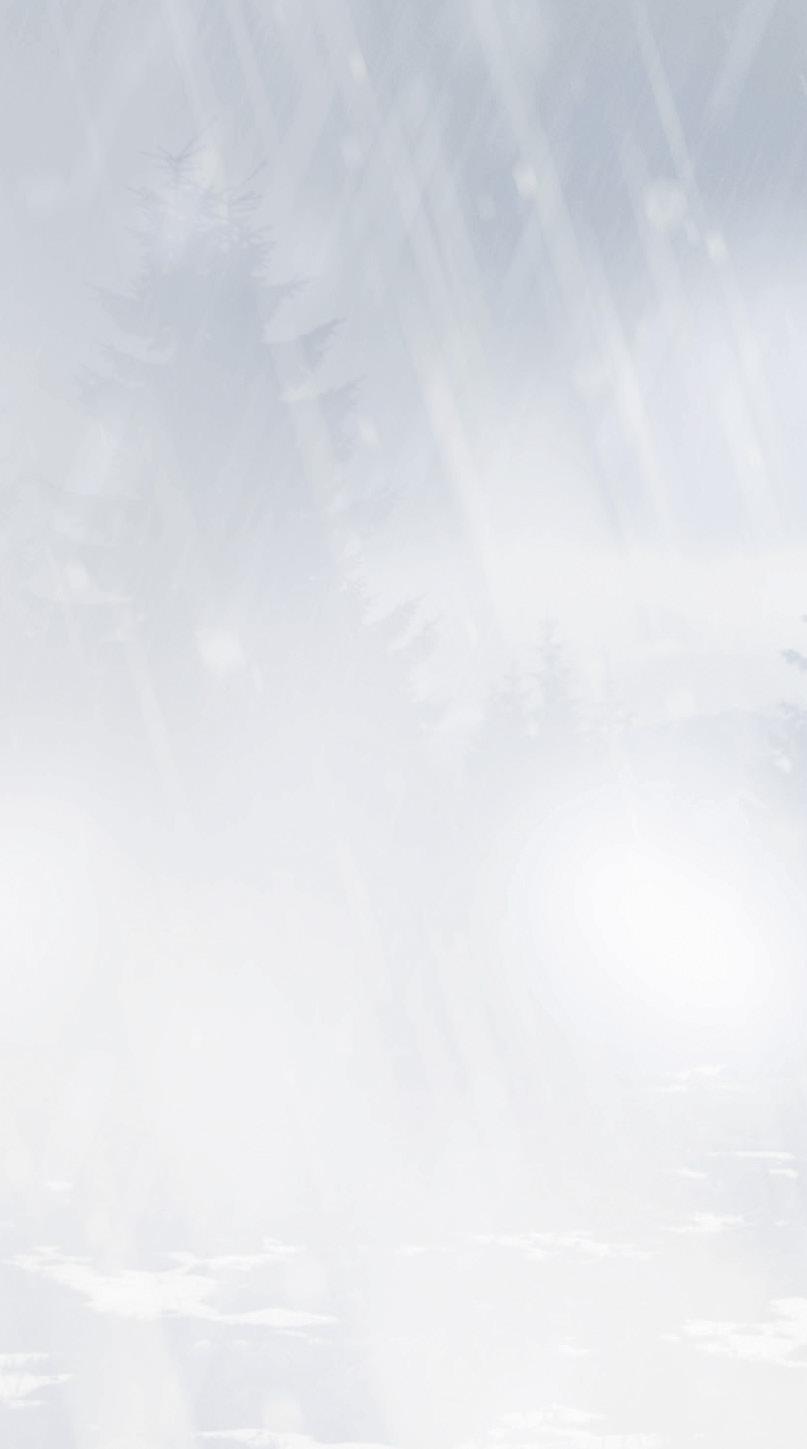
The peace that Jesus offers us is not in any way limited to or dependent upon our circumstances, rather it is grounded in God’s presence through his Holy Spirit within us. While the circumstances of our lives will continue to change, the peace of God will remain. We are not guaranteed a life without pain or trouble, but God does tell us that he will always be with us. When we seek the peace the world gives us, we will always ultimately feel disappointed and separated from God. This type of peace is at best temporary and at worst entirely elusive. The world’s peace will come and go, ebb and flow, based on the situations we find ourselves in.
Not a single one of us is able to attain the peace Jesus spoke of alone. We are, however, all in a position to choose it. Jesus’ promise was also an invitation. We are all invited to receive his gift. When we choose to draw near to God, we experience his constant companionship through
26 April 2024

the Holy Spirit. It’s in his company, or his ‘withness’, that we receive his gift of peace, regardless of our circumstances. Together, with his disciples, Jesus invites us to experience his ‘no matter what’ kind of peace. Jesus didn’t promise his peace in the absence of conflict; rather he promised his peace always.
When our peace hinges on our circumstances, we shouldn’t anticipate experiencing it frequently.
Peace beyond understanding
Followers of Christ frequently testify to encountering God’s indescribable peace and feeling intimately connected to their Creator during the most agonising seasons of their lives. Horatio G Spafford may not be
a name you have heard of, but you are likely familiar with the well-loved hymn he penned in 1873, ‘It Is Well with My Soul’. Horatio wrote the lyrics to this hymn after experiencing profound tragedy with the death of his son to sickness, the loss of most of his real estate investments in the Great Chicago Fire and then the devastating news from his wife that all four of his daughters had perished at sea. As Spafford travelled to meet his grieving wife, he was inspired to write these words:
When peace like a river, attendeth my way, When sorrows like sea billows roll;
Whatever my lot, Thou hast taught me to know It is well, it is well, with my soul (SASB 741).
Given the magnitude of his loss, it is natural to question Horatio’s choice of words declaring all was well with his soul. How was this man able to
When we choose to draw near to God, we experience his constant companionship through the Holy Spirit.
make such a claim in the depths of such personal pain?
If the peace we experience in our lives is circumstantial, we will know all too well how elusive it can be. Let’s consider allowing God to take us on a journey to redefine what his peace means. It is the deep work of our souls and our minds to begin to understand this ‘no matter what’ type of peace that Jesus promised us. Our world offers nothing that comes close.
saltmagazine.org.nz 27
Team Effort for Samoa
Sailivao Tusa Aukusitino Senio has been named Person of the Year 2023 by the Samoa Observer for his tireless work in The Salvation Army Addiction Services in the Samoa Region. But he says it’s a team effort—and there’s more work to be done. Ben Mack reports.
The warm weather, sandy beaches, crystal waters and green palm trees mean many people think of Samoa as paradise. But like anywhere else, there are challenges in living there. Among those challenges: drugs and alcohol.
But Sailivao Tusa Aukusitino Senio and his team at The Salvation Army are leading the fight against addiction, helping people from continuing down damaging paths that harm themselves and others, and offering hope for individuals and communities.
Senio says The Salvation Army is the only accredited alcohol and drugs addiction service provider in Samoa.
‘Unfortunately, people abuse alcohol a lot,’ he says. ‘You might go to church, be engaged in village activities, but alcohol turns you into a different person. The consequences can be lasting.’
A growing problem
Previously, there was little in the way of local programmes to support people struggling with addiction. ‘There were just no interventions, nothing was going to change by just locking people up.’
The roots of the programme go back to 2016. Senio was living and working in Auckland. He was contacted by New Zealand Justice Emma Aitken, who had been working in Samoa, to help set up an Alcohol and Drugs Court. ‘Back then, about 90 percent of the matters in court
were alcohol- and drugs-related,’ he says. ‘There was nothing here [for treatment]. The only choice was to go to jail.’
He was born in Samoa but grew up in Christchurch and was in Samoa about a year before returning to Aotearoa. Then, about seven months after he came back, he was asked if he’d like to return to Samoa to continue the important work.
‘I was very happy to get the call and have the conversation … but I didn’t tell my wife (Natalie, with whom he has two children) for three months! But when she said yes [that I could go to Samoa], I was the happiest man on earth.’
Addiction Services programme
The Salvation Army Addiction Services programme has seen and helped nearly 1900 people in Samoa since 2018, mostly men aged between 20 and 39. There are group programmes, one-toone counselling and programmes for people in prison.
Senio is a Drug and Alcohol Practitioners Association Aotearoa New Zealand (DAPAANZ) accredited and registered practitioner and clinical supervisor. He says that clients mostly come from the courts system. There are also church visits, and visits to schools, villages and more to raise awareness of the dangers of drugs and alcohol and the treatment options available if someone is struggling with addictions. ‘A lot of preventative stuff, education still needs
‘We’re fighting for our people who are struggling with addictions...’
to happen,’ he says. ‘Raising awareness, especially among the youth, is key.’
Most programmes are run on Upolu— Samoa’s most populous island, home to the capital Apia and the international airport and also where Senio and the team are based. But he says the hope is especially to reach other islands in Samoa, such as Savai‘i. The need for education and support, he says, is nationwide, no matter what island someone lives on.
Extending the programme
On the subject of reaching more people, Senio says a women’s programme was launched in February this year. It is run in prison; however, they also see women for one-to-one counselling, with some engaging in a group programme run at The Salvation Army’s premises in Vaivase. ‘We’re fighting for our people who are struggling with addictions,’ he says. ‘There’s still a lot of work to be done. It’s a big need.’ But he’s seen positive signs and had many positive interactions.
‘It’s always good to engage with churches, to talk to people about their roles as fathers, providers, family members, community members,’ he explains. Doing so, he adds, can remind people of their responsibilities—and how drugs and alcohol can make it harder to fulfil those responsibilities. ‘God is everything to people here, but there can still be temptations.’
Senio says one of the most rewarding parts of his work is seeing people overcome their addictions and
28 April 2024

reconnect with their family, church and community. ‘Every time someone graduates [from our programmes], they say a testimony about their experience. When they say they’re going back to church, re-engaging with their community, it really hits the spot. You realise it’s not about you. It’s about them, their families, their communities.’
Person of the Year award
Senio’s work has been rewarded in another way, too: this past December he was named Person of the Year by the Samoa Observer, the country’s largest newspaper.
‘I was wondering, “why me?”’, Senio says of finding out about winning the prestigious award. ‘But I was also really thinking of the team—my wife, family, the clinicians, and The Salvation Army in Samoa.’ He says, ‘The team really needs to be acknowledged. I was really
‘God is everything to people here, but there can still be temptations.’
representing the team [in receiving the award]. Especially my wife. If she didn’t say yes five years ago that I could come to Samoa, we wouldn’t be here. She was really behind the big push.’
Senio also says there’s still more work to be done. ‘God has a plan. He has a plan for everybody. And we’re here now because of that plan.’

saltmagazine.org.nz 29
Above: Sailivao Tusa Aukusitino Senio (back row, second from left) with the team in Samoa. Absent: Munty Taulealo and Oliver Seumanufagai; Right: Sailivao Tusa Aukusitino Senio.
Kiwi Generosity Alive and Well
A big thank you to all our corporate partners for the wonderful work you do to support our mahi (work). Your support, particularly with appeals, has benefitted The Salvation Army and the whānau we journey with. The Woolworths Christmas Appeal raised $414,000 with customers donating $214,000 in 2023. Woolworths NZ also makes food rescue donations to our foodbanks, amounting to several million dollars per year. The Kmart Wishing Tree Appeal, in its 30th year, produced over $58,000 in monetary donations and over 15,000 donated gifts. The Back-to-School Appeal with The Warehouse Group has raised $72,000 for whānau to meet uniform costs and purchase school stationery.
John Mawdsley, Corporate Partnerships Manager
For the full story, go to saltmagazine.org.nz
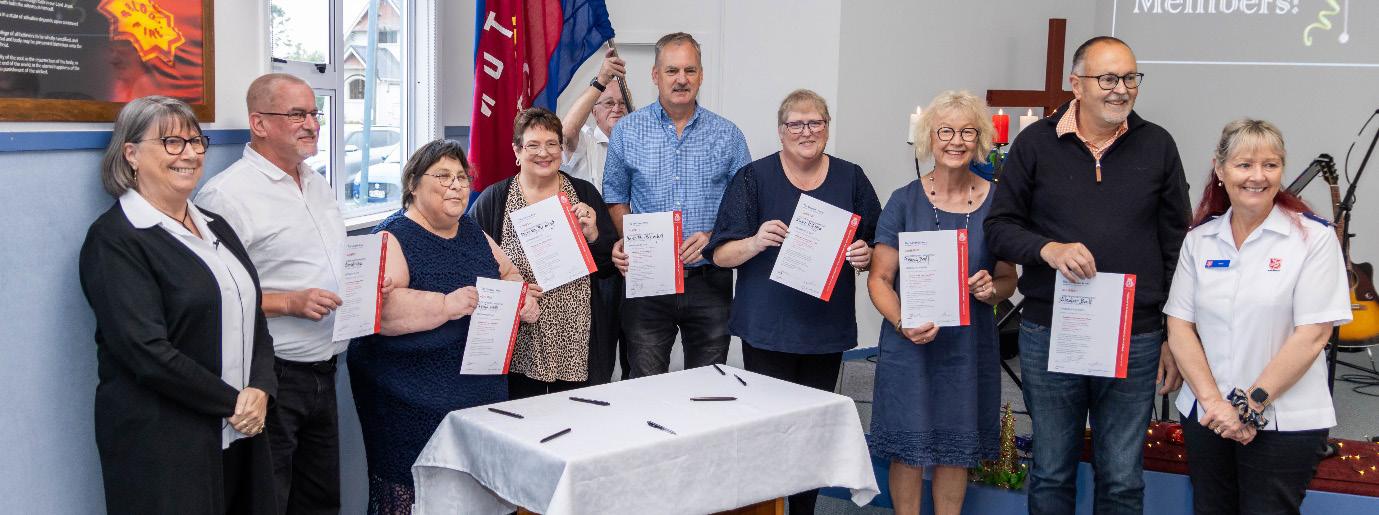
Included in Foxton
Every week, new faces are calling into the ‘Hub’ at Foxton Corps to enjoy a cup of coffee and a chat. Anita Goode, corps sergeant major and Community Ministries mission coordinator, has been involved in the development of the Hub since the beginning, and is excited to see more and more people accessing this community resource. Anita has observed people coming in for one service and then staying to talk with others. ‘We are starting to see the fruit,’ she says. ‘Initially we were responsible for starting conversations with the newcomers, but now people engage in conversations with one another and have forged their own connections. They know it’s a safe place,’ she says.
For the full story, go to saltmagazine.org.nz
Regional Rescue
February 9 was the official opening of the first Salvation Army housing development in Levin. The new development is on Hinemoa Street at the southern end of Levin. Built at a cost of about $15 million, when it is completed by the middle of this year there will be 52 units in total. ‘This complex has been four years in the making and is a partnership between The Salvation Army Social Housing (SASH), Levin Corps members Wayne and Bridget Bishop and Levin Corps,’ says Director of Social Housing and Property Greg Foster. ‘All these people have been on the Housing Register, and for many of these whānau (families) this will be the first secure housing they have lived in.’ The development will also include a playground, outdoor community area, central administration area, car parks and an orchard. For the full story, go to saltmagazine.org.nz
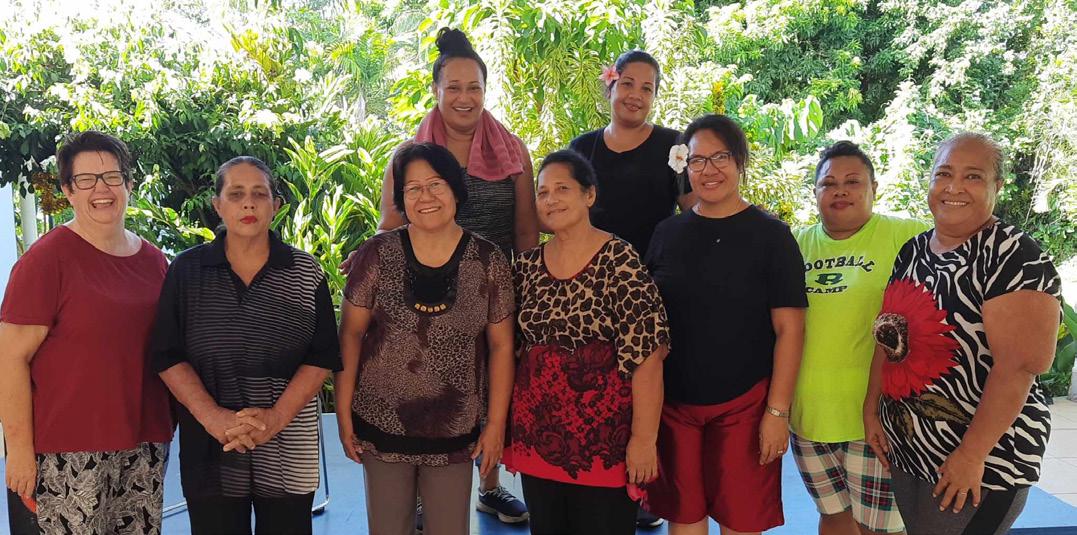
International Women’s Day
Hundreds of bars of chocolate were given out and women in every corner of our territory were celebrated for International Women’s Day (IWD) on 8 March. In Royal Oak, women in the Positive Lifestyle Programme were invited to a morning tea and were honoured with a gift. Commissioner Julie Campbell was in Tonga for celebrations, where there was a Women’s Rally. In Samoa, women celebrated with Zumba! Major Julie Turner says there was also an opportunity to talk about women’s issues. ‘IWD gives us an opportunity to talk about gender equity issues and what life is like for women,’ she says.
For the full story, go to saltmagazine.org.nz
30 April 2024
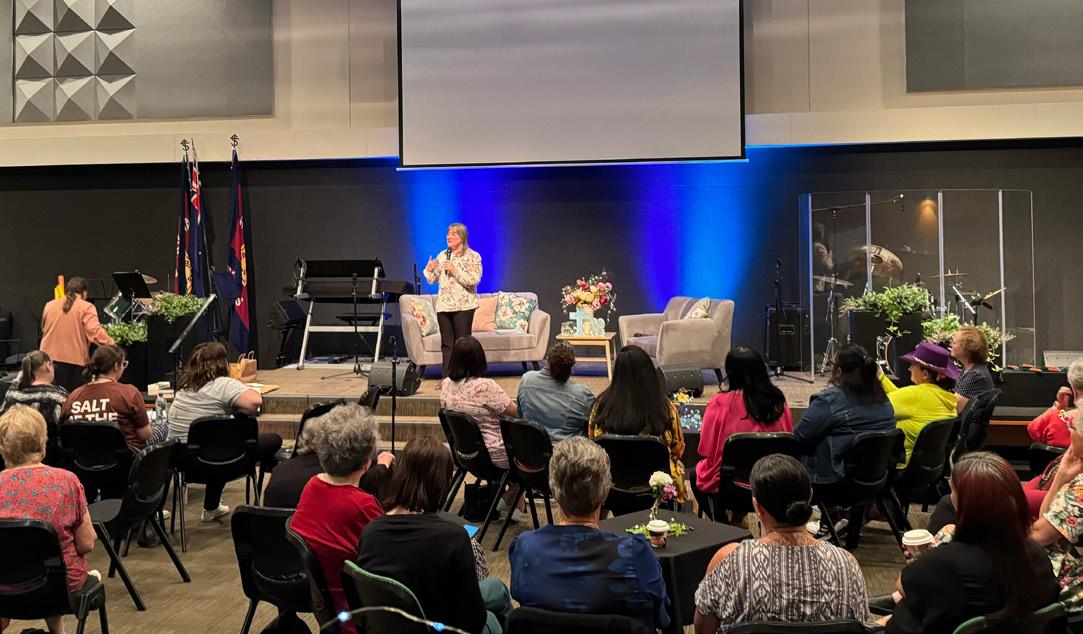
Night Out in Hamilton
On Monday 11 March, The Salvation Army Hamilton City Corps held its first ‘Girls’ Night Out’ for 2024. Around 90 women arrived to the aroma of freshly made barista coffee, which helped foster conversation and connection in the large café area. Attendees had the opportunity to try their hand at some craft activities, including paint marbling for a journal cover and gift bags created using beautiful stencils. The special guest for the evening was Jules Badger, co-author of When the Lights Go Out, who shared about the decline of her mental health in 2012 and offered a few pearls of wisdom from her recovery journey experience, as well as some encouragement for continued mental wellbeing in the 21st century.
For the full story, go to saltmagazine.org.nz
World Day of Prayer
Friday 1 March was World Day of Prayer (WDP). Throughout the New Zealand, Fiji, Tonga and Samoa Territory, groups participated in the WDP either by attending services organised by other church partners or leading their own services. ‘Informed prayer and prayerful action’ is the motto of the WDP, which takes place annually in over 170 countries. At Territorial Headquarters a small group of people met in Pollard Hall to pray together, led by Territorial Secretary for Women’s Ministries Lt-Colonel Elsi Sarimin. The 2024 theme was ‘I beg you … bear with one another in love,’ based on Ephesians 4:17.
For the full story, go to saltmagazine.org.nz

Student Discount and Free Wi-Fi!
During orientation week and the welcome festival at Victoria University, The Salvation Army Cuba Street wanted to make sure students knew there was also a supportive and loving faith community they could be part of. Students and young people from The Salvation Army Cuba Street volunteered at a stall, alongside some more ‘mature’ corps members, giving away free coffee and chatting with students. ‘The coffee was just a conversation starter for us to share who we are and what we have to offer students,’ explains Student Ministries Coordinator Noah Spargo. ‘We’re already seen fruit from some of those conversations. We had a young lady show up at church on Sunday because we had a conversation during orientation week. We’re excited!’
For the full story, go to saltmagazine.org.nz
Looking for more news?
Read the latest news online at saltmagazine.org.nz
saltmagazine.org.nz 31
Official Engagements
Commissioners Mark (Territorial Commander) and Julie Campbell (Territorial President of Women’s Ministries)
2 April: Instalment of Captain Chris Collings as Training Principal, Booth College of Mission
12–22 April: Visit to Fiji and Samoa
24 April: ANZAC Service, THQ
28 April: Central Youth Event, Palmerston North
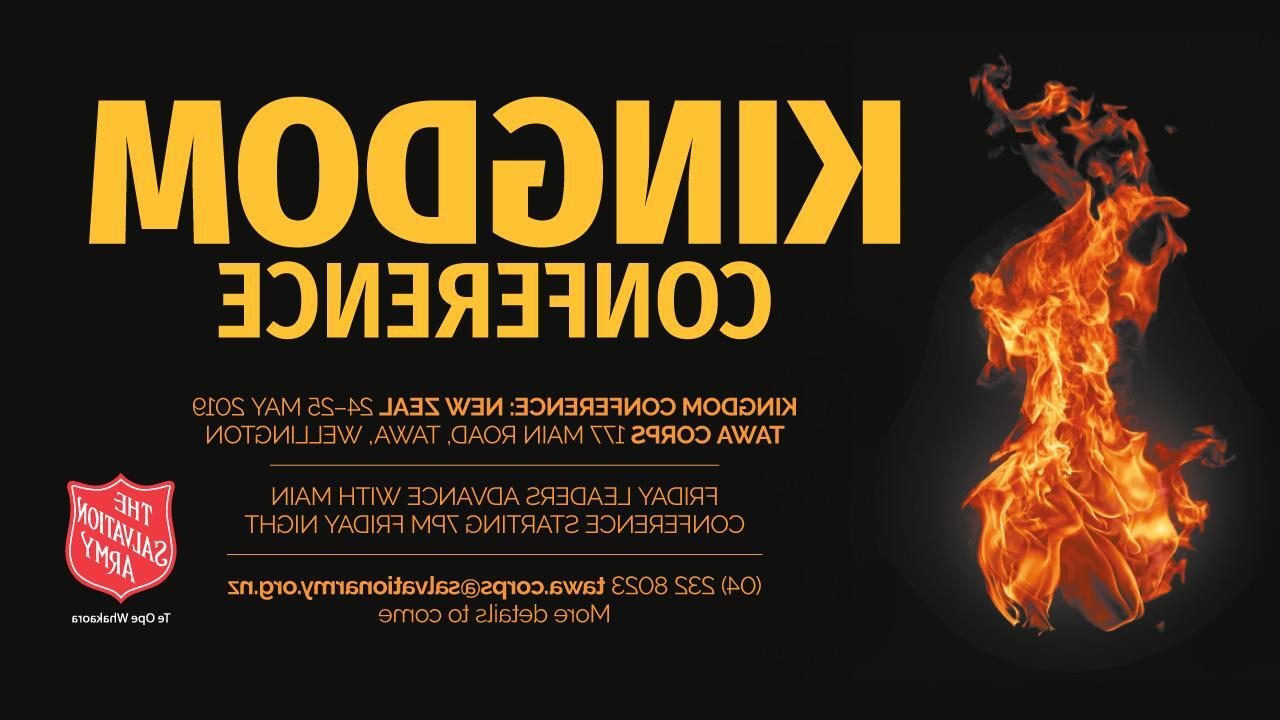
Bereavement: Mele Tuimana, the sister of Cadet Elina Palu, passed away in Auckland on 29 February 2024. We ask you to uphold Cadets Elina and Sateki Palu, and other family members in your prayers in this time of grief and loss.
Jieni Uludole, the mother of Captain Peniasi Torocake, passed away on 3 March 2024, from Fiji, aged 74 years. We ask you to uphold in prayer Captains Peniasi and Tavaita Torocake, and their extended family in this time of grief and loss.

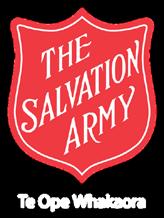
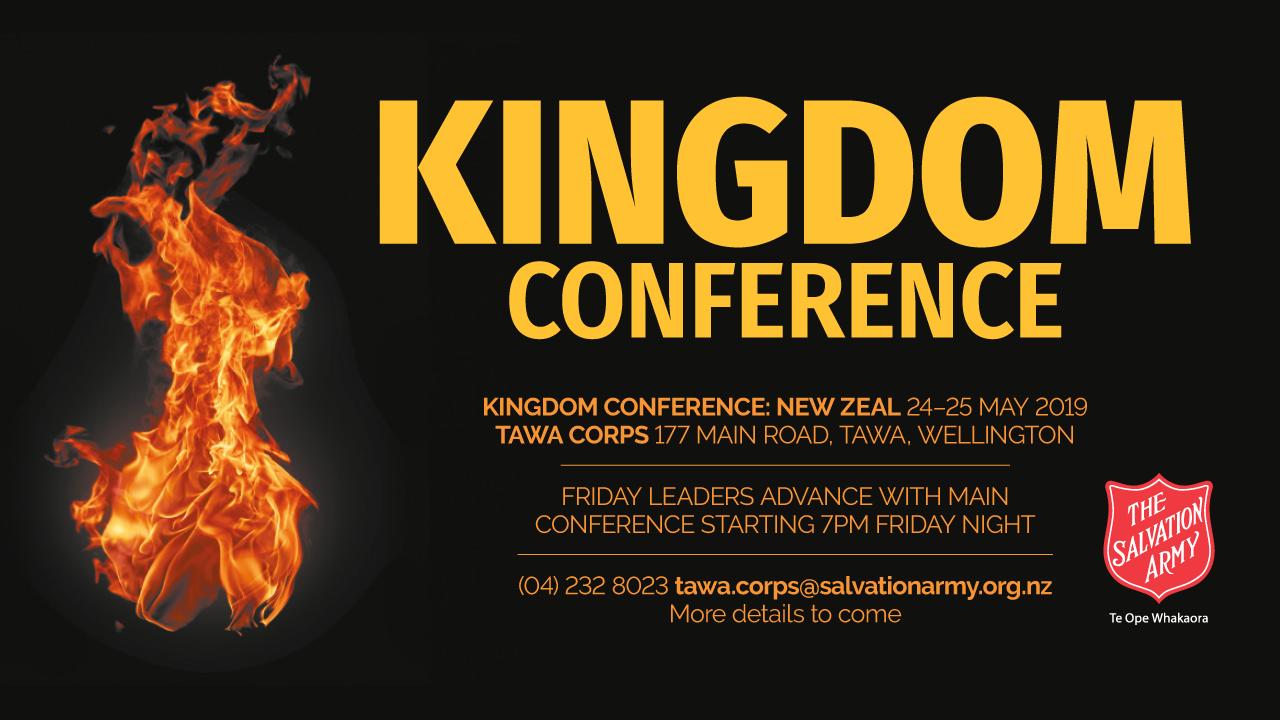

Quiz Answers: 1. Stockholm, 2. Canada, 3. Leo Tolstoy, 4. Dove, 5. John Lennon. SAVE THE DATE SAVE THE DATE THE SALVATION ARMY THE SALVATION ARMY PALMERSTON NORTH PALMERSTON NORTH 4th-6th OCTOBER 2024 4th-6th OCTOBER 2024 REGISTRATIONS OPEN SOON! CHILDREN’S PROGRAMMES AVAILABLE CHILDREN’S PROGRAMMES STAY THE COURSE STAY THE COURSE Second printing in stock NOW Purchase the book at tinyurl.com/ BadgersBook 32 April 2024
SALVATIONISTS IN HISTORY
Stitch in Time
In part two of our three-part series, we continue to see the development of an early Salvation Army archive and research centre, and the efforts of Nola Bradwell and her husband Cyril to establish this, as told in her daughter’s book The crafts of cloth, needle and thread: Nola’s story (abridged).
In an undated letter around 1988–89, Nola made clear that until permanent space was allocated, establishing the archive as a functioning research centre was impossible. Nola reported this more bluntly than Cyril’s telling of the story in [his book]
Touched with Splendour :
Dad and the Historical Trust are pushing for space and consideration to be given for the archives in the planned new Army THQ. They have almost got the go-ahead from the Council. At times Dad has been disappointed at the Army’s attitude about these matters, but on Friday Laurence Hay and Dad had another interview with the Territorial Commander and he has agreed for them to get an experienced person to advise them on how to start to set things up and what would be required.
In the event, specialist space with archival shelving was provided in the new THQ building in Cuba Street, encouraging, too, the donation of many more items and documents. In an undated letter in 1990 Nola explains that one of the reasons they are delaying their planned overseas travel is because ‘Dad wants to be in Wellington to help Laurence Hay get the Army’s archival centre functioning afer all the pushing for it. He wants to see it WORKING!’
There was also specialist training because Nola reports in a letter c.1991 that, ‘I’ve spent Friday night and all Saturday at an archives textiles seminar. I found it most interesting and learnt a lot. Laurence Hay was there also. The Army paid my expenses.’
Laurence recalls attending a number of courses on various aspects of archiving and preservation during this time, as did Cyril.
After returning from some international travels in 1992, Cyril reports on several Salvation Army archive centres

they had visited, noting too how pleased they were to be home and resuming their work at the archive: Nola, assisted valiantly by Marjorie Goffin, was able to extend and consolidate the work she had been doing for some years in building up a wide-ranging display of Salvation Army uniforms covering various eras, ranks and types. Nola’s remarkable tailoring skills were invaluable in the achievement of a uniform collection superior to anything I have seen in other Army heritage centres throughout the world.
Retired Mrs Commissioner Marjorie Goffin and her husband Dean Goffin were long-time friends of Cyril and Nola. After Commissioner Goffin’s death Marjorie had, in my father’s words, ‘deposited a treasure trove of correspondence, music manuscripts and miscellaneous papers, photographs and other memorabilia’ in the archive. She also volunteered to work with Nola.
A visit to the archive by the international leader of The Salvation Army, General Eva Burrows, in 1993, was photographed. Undoubtedly she was shown Nola’s uniform and paraphernalia collections. Burrows’ interest in the archive was long standing. On a visit to New Zealand for its Salvation Army Centennial in 1983 when Eva Burrows was Commissioner for the Australian state of New South Wales, she asked to meet Nola and Cyril to discuss the Historical Trust. Taking documents and ideas back to Melbourne, she set immediately about establishing a heritage centre there.
Print copy can be purchased for $10.00 by sending an email to: archives@salvationarmy.org.nz; or print for free from the Archives website: archives. salvationarmy.org.nz/our-publications
From left: Nola Bradwell, Major Laurence Hay, Major Doris Watts, General Eva Burrows, Cyril Bradwell and the General’s assistant at the Army Heritage Centre and Archives.
saltmagazine.org.nz 33

Growing with God
As parents we love to see our children grow and develop. From babies to young adults, we have been on this journey of measuring their milestones. We also understand that having a spiritual foundation is important for children so they can learn to develop strong faith and godly values that can help guide their lives as they mature.
There are several things we can do as parents to help foster spiritual growth in our children:
• Keep communication open by encouraging children to ask questions and openly discuss topics related to faith and spirituality.
• Take part in activities with your children, for example, read the Bible, memorise verses, listen to Christian songs, attend church services, be involved in the life of the church and give opportunities to serve.
• Teach your children how to pray. Prayer is an essential part of spiritual growth and can help children feel connected to God and develop a greater understanding of how to listen and talk with God.
Many things can be done to help develop spiritual growth in children. By understanding the importance of spiritual growth and providing your children with the necessary guidance and support along the journey, we can help them to develop a strong faith.
A family devotional has been created for International Children’s Day which focuses on these three areas of spiritual growth: reading the Bible, asking questions and prayer. Ask your children’s leader or corps officer for a copy of the devotional or visit The Salvation Army International— International Day of Children and Young People 2024 website: salvationarmy. org/ihq/idcy24 to download a copy.
‘He (Jesus) told them another parable: “The kingdom of heaven is like a mustard seed, which a man took and planted in his field. Though it is the smallest of all seeds, yet when it grows, it is the largest of garden plants and becomes a tree, so that the birds come and perch in its branches”’
(Matthew 13:31–32)
Read: Jesus uses the parable of a tiny mustard seed to explain how something so small can grow into a big tree; a tree that is so large it provides shelter for the birds. Just like the mustard seed, our faith, actions and smallest contributions can have the potential to have a significant impact and to bring change in this world.
Think: Plants don’t grow on their own, they need water and sunlight. Our faith also needs help to grow. We can grow our faith by reading stories from the Bible and thinking about what God is saying to us. We can talk and listen to God through our quiet times with him.
Pray: Dear God, plant your words in my heart like seeds. Let them grow and make me kind and loving, through the Holy Spirit. Fill me with your love and help me spread your good news wherever I go. In Jesus’ name, Amen.
Do: Why not try planting a seed and watch it grow? It will remind you of this special story about how tiny things, just like our faith, can grow into something much bigger when we take care of them. Be sure to use a container and some soil in which to put your seed. Then give it water and sunlight to help it grow.
34 April 2024
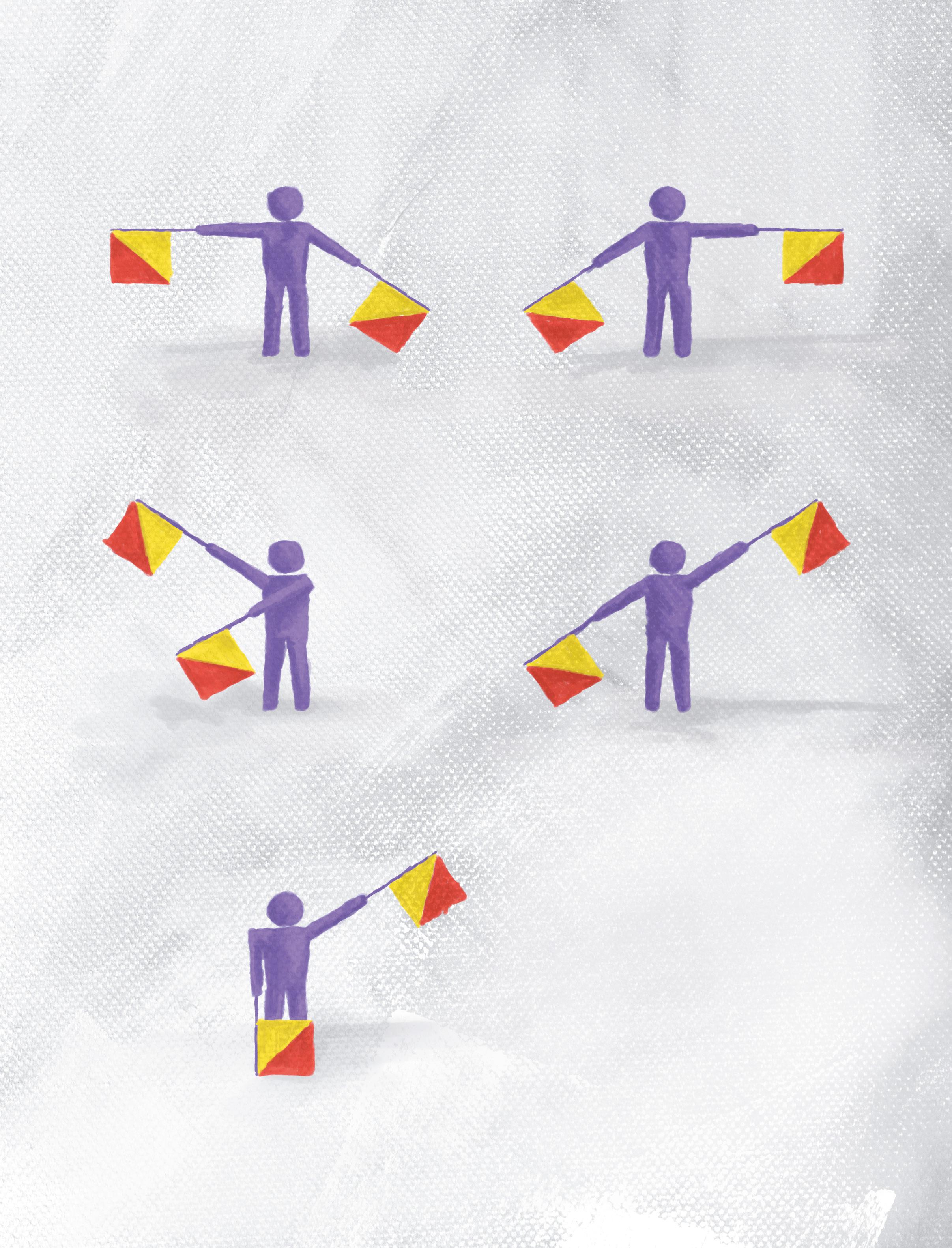
Peace
starts with a smile.
Mother Teresa

























































